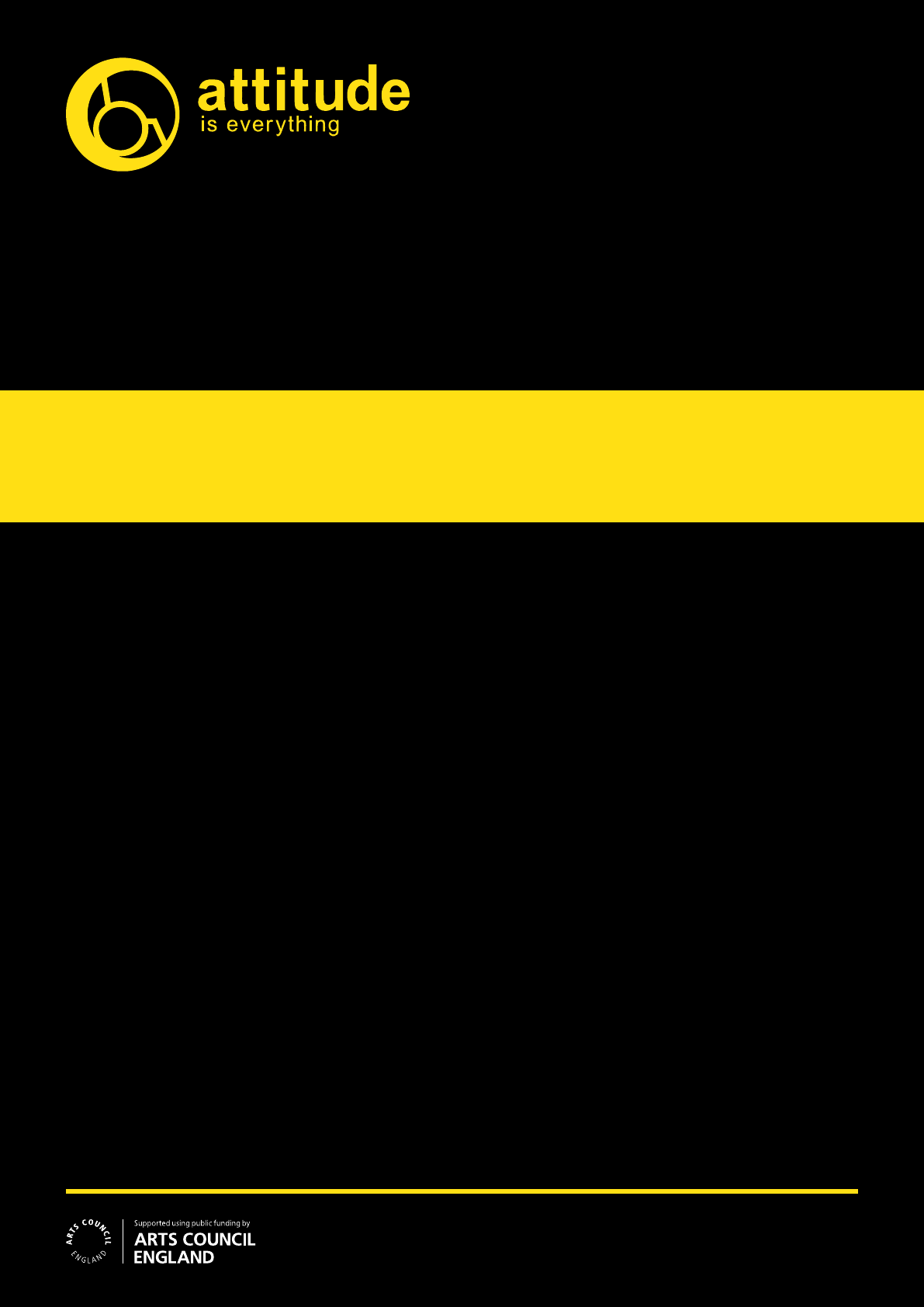
Foreword ........................................................................................................................ 1
About Attitude is Everything ........................................................................................... 2
History of the State of Access Report ............................................................................ 3
Focus of this report ........................................................................................................ 4
What is ‘Access Booking’? ............................................................................................ 5
The Access Booking Survey ......................................................................................... 6
Keyndings ........................................................................................................... 8
Context. ........................................................................................................................ 10
Before booking ............................................................................................................. 15
Venue access schemes ...................................................................................... 15
Proof of access requirements ............................................................................. 16
Access information ............................................................................................. 19
Booking methods ......................................................................................................... 20
Booking face-to-face ........................................................................................... 20
Booking by email ................................................................................................. 20
Booking by phone ............................................................................................... 21
Booking online. ................................................................................................... 26
Beyond simple sales .................................................................................................... 30
Booking for a party .............................................................................................. 30
Pre-sales ............................................................................................................. 30
VIP and artist meets ........................................................................................... 32
High demand events ........................................................................................... 30
Gift vouchers ....................................................................................................... 34
Resales ............................................................................................................... 34
The impact of bad experiences .................................................................................... 35
Conclusion .................................................................................................................... 36
What customers need .................................................................................................. 37
Our vision for access booking ...................................................................................... 38
The Ticketing Without Barriers Coalition ...................................................................... 40
Beyond live music......................................................................................................... 42
Share this report ........................................................................................................... 43
Follow Attitude is Everything ........................................................................................ 44
Acknowledgements ...................................................................................................... 45
Contents

1
UK Music is committed to working with Attitude is
Everything and being a part of their continuing mission
to make live music accessible to all.
We are proud to have supported the publication of
this report and encourage the whole of the live music
industry to follow those who have already played their
part in making sure their venues and events are open
to everyone.
In 2017, along with the UK Live Music Group, we were
delighted to endorse Attitude is Everything’s Charter
of Best Practice as the industry standard for live music
accessibility. The Charter has been supported by more
than 100 musicians, with over 130 venues and festivals
gaining awards so far. Attitude is Everything and its
fantastic Chief Executive Suzanne Bull MBE have done
brilliant work to improve the experience of Deaf and
disabled music fans.
However, it is clear that there is far more to be done to tear down the remaining barriers
that still stand in the way of Deaf and disabled fans getting the most out of live music
events. There needs to be a concerted effort across the industry to look at ways we can
work together to drive forward positive change.
That’s why we are supporting Attitude is Everything’s move, announced with the launch
of this report, to bring organisations and companies together to start a cross-industry
conversation around the booking of access requirements such as Personal Assistant
tickets and accessible seating.
TheTicketingWithoutBarriersCoalitionwillexaminewaysofdevisingaunied
approachtoaccessbookingthatbenetseveryone–fans,artists,venues,events,
ticketing companies and promoters. It’s crucial that this new Coalition is much more
than a talking shop and becomes pivotal in pushing ahead with a shared plan to usher
in real change across the industry.
I urge everyone across the industry to join UK Music and Attitude is Everything
in seeking to provide Deaf and disabled people the best possible access
booking experience.
No one should be denied the right to experience a live music event. We should not
rest until we can ensure equal access for everyone. Please do everything you can to
support Attitude is Everything.
Foreword
Michael Dugher,
CEO of UK Music

2
Attitude is Everything improves Deaf and disabled people’s access to live music by
working in partnership with audiences, artists and the music industry.
Having begun as a pilot project in 2000, we are now a fully independent charity and Arts
Council England Sector Support Organisation, supporting venue and festival organisers
to understand legal obligations, and implement best practice solutions to deliver
reasonable adjustments. Our ethos is that Deaf and disabled people should be able to
be as independent as they wish to be at live music events.
Mystery Shopping is the cornerstone of our work. Our dedicated team of Mystery
Shoppers are Deaf and disabled music fans who continuously report back on the
accessibility of UK music venues and festivals. In early 2018 we expanded the project
with the launch of a new online portal and increased capacity to engage with the
hundreds of Deaf and disabled people who lend their time and lived experiences
to support our work. In additional to this, we also run a festival volunteering project,
recruiting around 50 volunteers each year.
We channel feedback into our Charter of Best Practice, a framework with which to
examine all aspects of making a venue or festival as accessible as possible. Structured
around a progression route through Bronze, Silver and Gold awards, the Charter was
recognised by the UK Live Music Group in 2017 as the ‘industry standard’ when it
comes to live music accessibility. Over 150 venues and festivals have gained awards,
withmanymorehavingbenettedfromhistoricandongoingadvice.
In 2017, we launched the Grassroots Venue Charter, in order to tailor our work to assist
small independent venues facing unique challenges. In November 2017 we published
a DIY Access Guide for bands, artists and promoters to further support access to
music at the grassroots level. We also announced our new Attitude Champion model
in 2017, enabling us to apply the principles of the Charter of Best Practice to diverse
organisationsinapositiontoinuenceothers.
In recent years, we have run campaigns to promote our cause, from the artist-focused
Music Without Barriers social media campaign, to the guidance-backed Access Starts
Online campaign to promote the value of access information. Our CEO Suzanne Bull
MBE leads on our ongoing Parliamentary-level work to raise awareness of live music
accessibility, and in 2017 was announced as the DWP’s Sector Champion for the Live
Music Industry.
Finally, we continue to grow our commercial services via the ongoing delivery of
Disability Equality Training and Access Consultancy supporting major outdoor events
and venue construction projects. Over 6800 people working within the live music
industry have now received our training.
About Attitude is Everything
2

3
2011
TherstStateofAccessReport,publishedinNovember2011andlaunchedby
Matthew Hancock MP in the House of Commons, led to debates in Parliament and
meetings with Ed Vaizey MP, then Minister of State for Culture and the Digital Economy.
The report culminated in a set of aspirations centred on access provision being
promoted and enforced via the licensing process.
2014
The second State of Access Report was published in January 2014 and launched at
the Roundhouse in London. Its call to action focused on ticketing and access-related
bookings, with the central aspiration being development of a system to provide universal
proof of disability for access provision-booking purposes, and thus the implementation
of equality of access when it comes to online ticket bookings.
A major outcome of that report was the formation of the STAR Accessible Ticketing
Working Group, a coalition of ticket retailers, venue and festival organisers and Attitude
is Everything to work towards the creation of online access booking for Deaf and
disabled music fans.
2016
The third State of Access Report was published in February 2016 and launched at Bush
Hall in London. This report revisited many topics highlighted in the previous two reports,
withcentralthemesbeingtheimportanceofaccessinformationprovision,thebenets
of treating accessibility as an extension of customer service, and the need for facilities
tobetforpurpose.
The major outcome of this report was the launch of the Access Starts Online
campaign, which provides venues and festivals with simple guidance on how to create
access information.
Timeline
3

4
For this report, we have decided to focus our attention on the key customer service
issuethatimpactstheabilityofDeafanddisabledpeopletoaccesslivemusic–
the experience of seeking to pre-book reasonable adjustments in order to meet
access requirements.
In our 2016 State of Access Report, we asserted that access depends on
customer service.
This has never been more the case, as venues and events across the UK put in place
an array of access provisions whilst needing to control access to these via pre-booking.
This report is designed to offer a snapshot of how these models are currently working,
sharing best practice case-studies, and teasing out what still needs to improve.
In doing so, we will examine what barriers can arise when accessibility has been
considered and adjustments put in place, but is then subject to the gatekeeping process
of having to be booked.
We have decided to narrow our attention in terms of the scale and nature of the venues
and events that this report is concerned with.
Our focus is:
•
Single day outdoor concerts.
•
Medium to large music venues and arenas.
In addition to this, the target audiences for this report are:
•
Events and venues with in-house ticketing departments.
•
Events and venues that utilise third party ticketing partners.
•
Ticketing companies that provide services to events and venues.
‘Reasonable adjustments’ are changes to policies, procedures or the physical
environment that remove barriers that might place Deaf and disabled people at a
substantial disadvantage when seeking to access something on an equal basis to non-
disabled people. The Equality Act 2010 states that service providers have a duty to
make reasonable adjustments.
‘Access requirements’ are the changes a Deaf or disabled person needs in order to
access something on an equal basis to non-disabled people.
Focus of this report

5
What is ‘Access Booking’?
Access booking is our term for the advance booking of certain reasonable adjustments
that relate to the allocation of tickets, seating and/or limited space within a venue or
event space.
What needs to be bookable?
Deaf and disabled customers often require one or a combination of the following things
when seeking to access live music:
•
A ticket/seat for a Personal Assistant (PA) to provide support in order to attend.
•
Tickets/seats for multiple Personal Assistants in certain circumstances.
•
A wheelchair-accessible space or a location to transfer onto a seat.
•
A step-free seat.
•
A seat with a maximum number of steps to reach it.
•
Access to the best location to access British Sign Language interpretation,
captioning of lyrics or audio-description.
It is the booking of these core reasonable adjustments that this report is concerned with.
Other access requirements
There are a wide range of additional access requirements that people might need to
discuss with a venue or event, and make arrangements for that are currently outside of
therealmof‘accessbooking’asdenedabove.
These include:
•
Bringing medical equipment or medications.
•
Bringing an assistance dog.
•
Bringingspecicfoodoruids.
•
Gaining early entry to avoid crowds or become familiar with a space.
•
Being guided to a seat.
•
The ability to come and go during a performance.
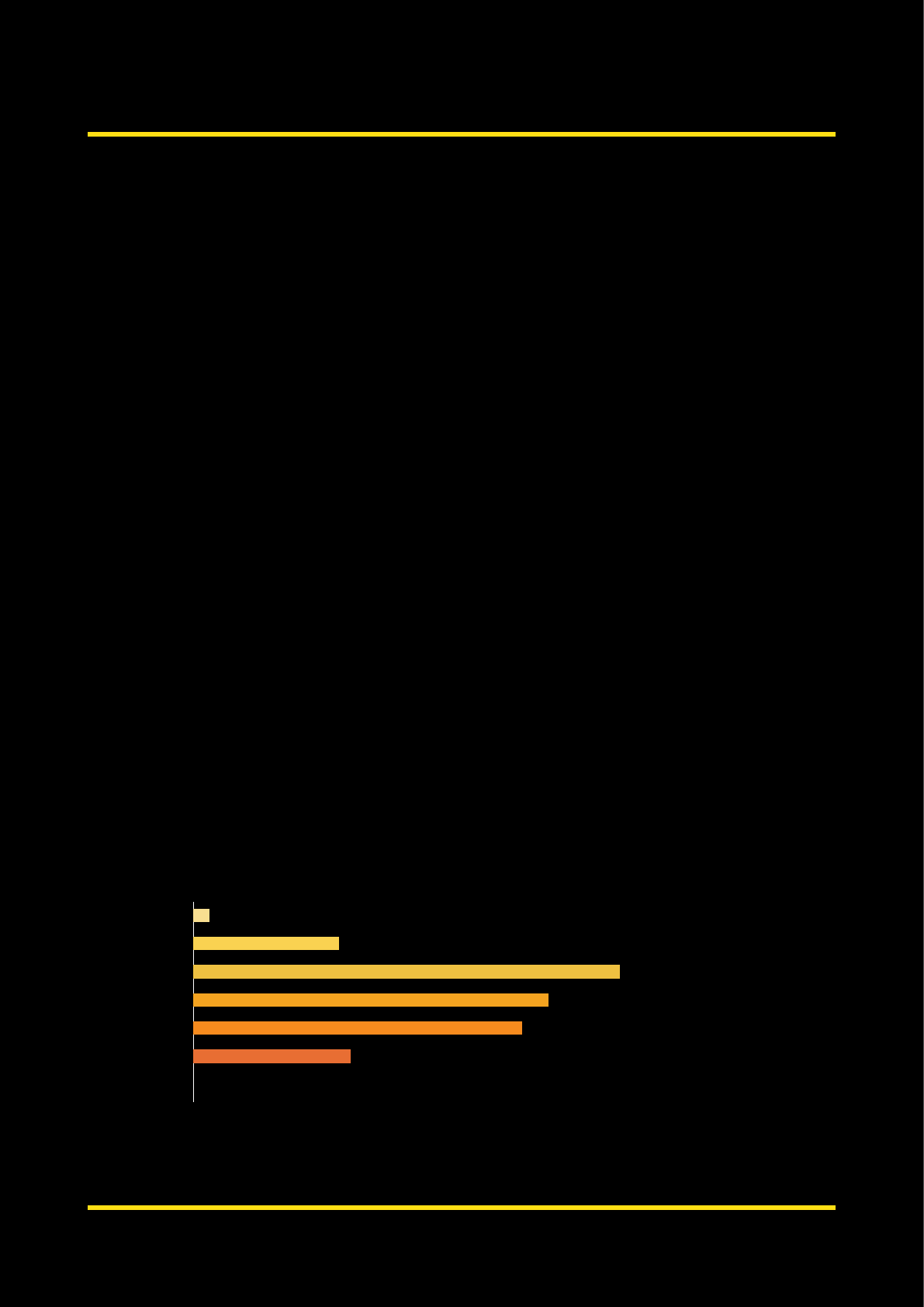
6
The Access Booking Survey
In a departure from previous reports where we used Mystery Shopping data, we
decidedtoframethisreportsolelyaroundthendingsofourrstnationalonlinesurvey
of Deaf and disabled music fans. The Access Booking survey, which was live from 20th
December 2017 to 28th January 2018, gave the public the opportunity to share their
good and bad experiences and the personal impact of going through the process of
attempting to book access to live music.
We targeted the survey at Deaf and disabled fans who book their own tickets and
access, and those who book on behalf of family members or the people they support.
The survey was shared by a wide array of organisations and networks across the UK,
including STAR, UK Music, Scope, Disability Wales, Euan’s Guide, Epilepsy Action, The
Brain Injury Hub, NUS, Spinal Injuries Association, Shape, Disability Horizons, Wheels
for Wellbeing, Sound Connections, VocalEyes, Inclusion Barnet, Birmingham Sight Loss
Council, Exeter Deaf Academy, Pocklington Trust, Shine, Performance Interpreting,
Shaping Our Lives, Deaf London, Arthritis Research UK, Action Disability Kensington
and Chelsea and Disability Arts Online.
Demographics
Participants
349 people completed our Access Booking Survey:
•
293 Deaf and disabled people (84%)
•
56 people who book access on behalf of a Deaf or disabled person (16%)
We asked people who book on behalf of others to complete additional demographic
questions on behalf of those people, so the following results illustrate the demographics of
the 349 Deaf and disabled people represented in our Access Booking Survey data set.
Age
Under 15
0%
16-24
11%
25-34
23%
35-44
25%
45-54
30%
55-64
10%
65-74
1%
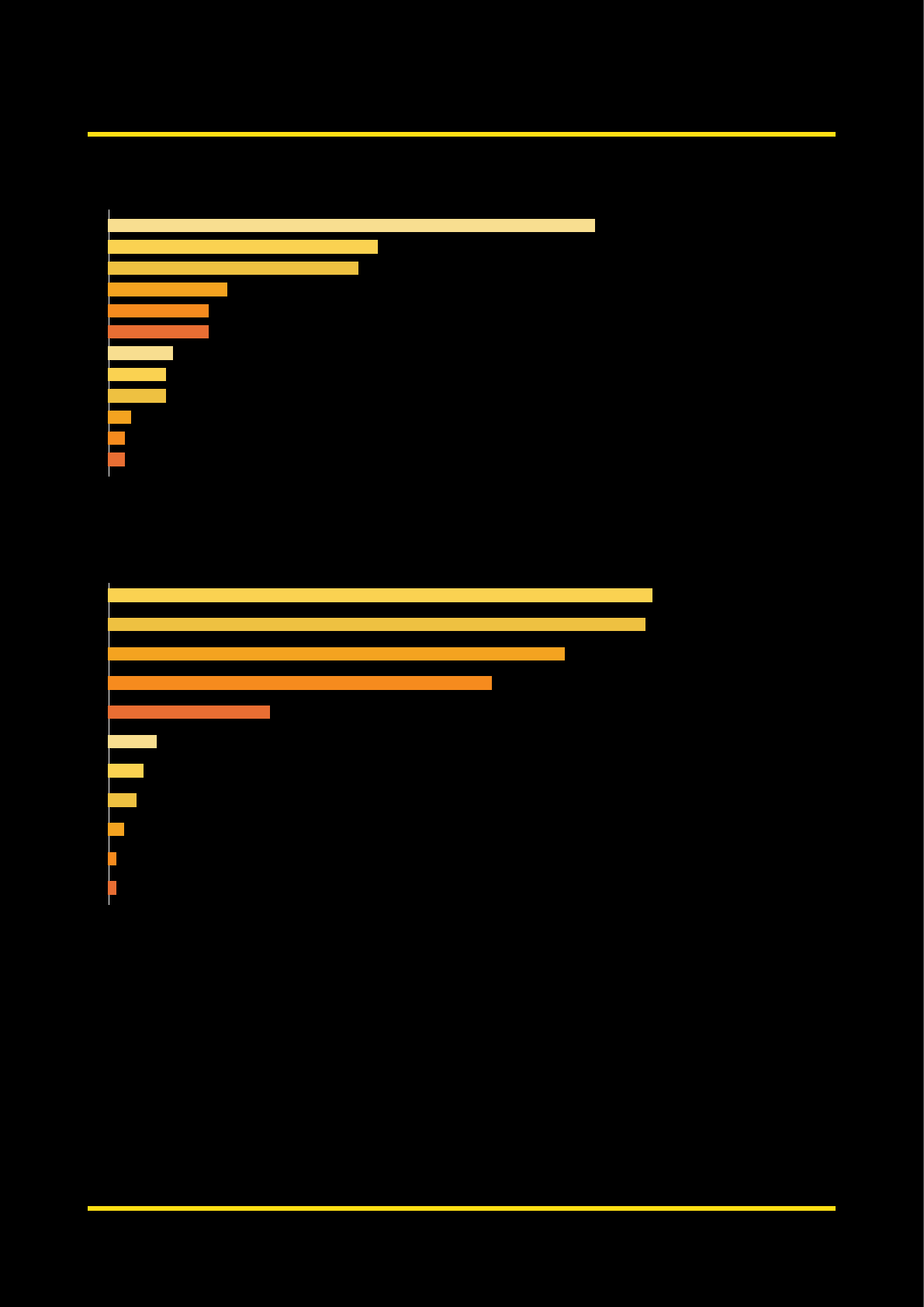
7
Impairments and health conditions
Access requirements when booking tickets and attending live music events
Relationship with Attitude is Everything
31% of participants were Attitude is Everything mystery shoppers and/or
festival volunteers.
69% of participants had not volunteered with Attitude is Everything previously.
68%
38%
35%
17%
14%
14%
9%
8%
8%
3%
2%
2%
Mobility Impairment
Other
Involuntary Noise
Photo-sensitivity
Autistic Spectrum
Learning Disability
Vision Impairment
Hearing Impairment
Non-visible Impairment / Health Condition
Mental Health Condition
Chronic Physical Health Condition
Wheelchair User
77%
76%
54%
64%
23%
7%
5%
4%
2%
1%
1%
Accessible seating
Communication device user
Assistive Technology to access websites
Assistance dog user
British Sign Language interpretation
Captioning
Hearing loop
Lowered bar / counters
Step-free access
Accessible toilet
Personal Assistant
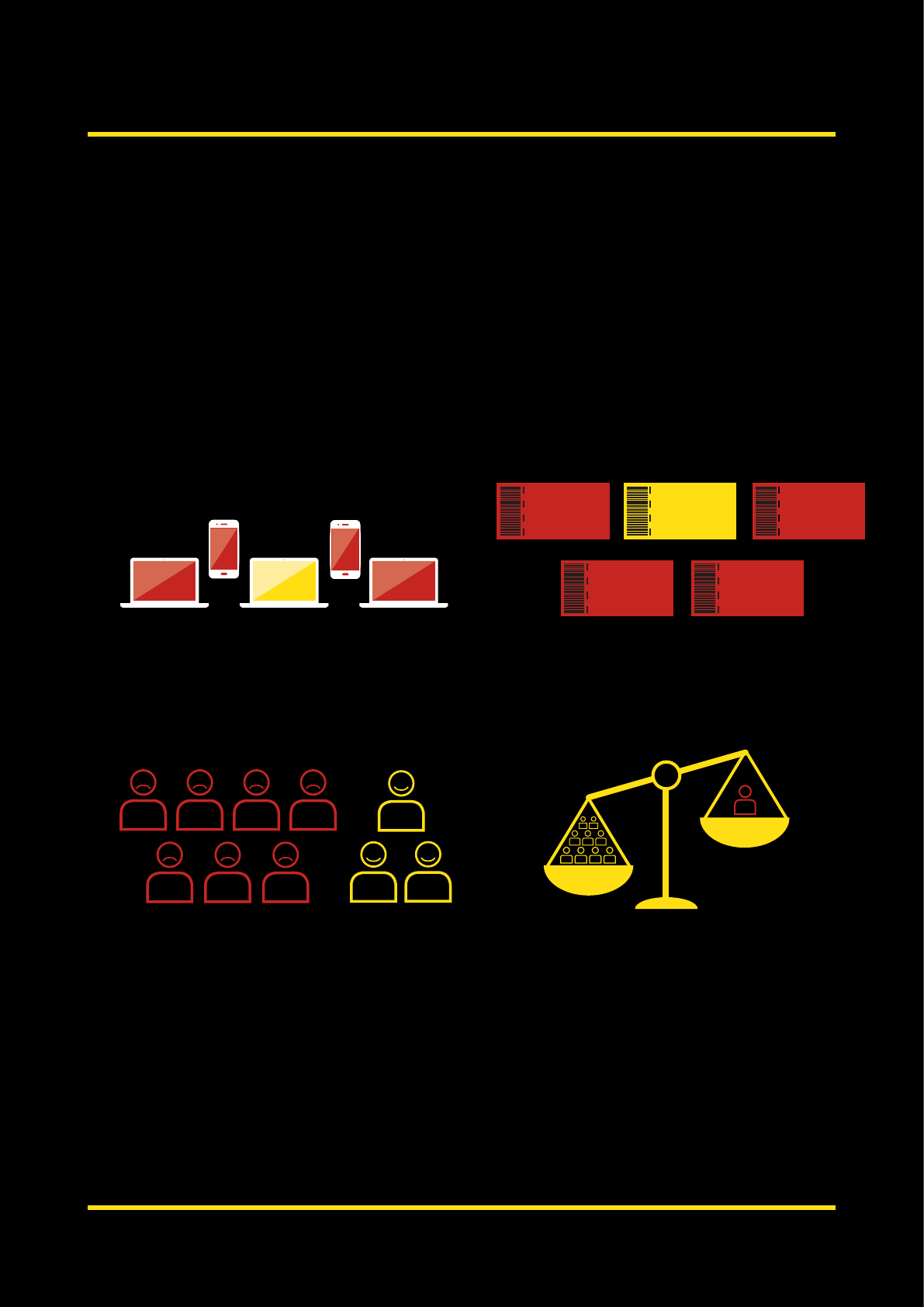
8
Key findings
In a small survey of our Mystery Shoppers commissioned for our 2014 State of Access
Report, 95% of respondents said that they had experienced issues when booking
access to live music events. 83% said that they had been put off buying tickets as a
result. 88% said that they had felt discriminated against and 47% said that they have
considered legal action.
For this report, we asked questions that echoed the 2014 survey, in order to gain a
sense of the overall picture when it comes to people’s experiences of attempting to
book access. Whilst being unable to draw direct comparisons, we can note a positive
shift in what people have reported this time around, despite the majority still reporting
signicantissues.
11%ofpeoplehavingconsideredlegalactionisstillsignicant.Webelievethiscould
behigherifnotforthesignicantbarriersthatexistwhenitcomestopursuinglegal
redress.Theseincludethelackofpubliceducationregardinglegalrights,nancialcost,
lackofsupporttopursueclaims,barriersinherentintheprocessoflingclaims,andthe
mentalhealthimpactofhavingtoghtforbasicaccessandequalityonacontinuous
basis across all areas of life.
1 in 10 have
considered legal action
73% of people had felt discriminated
against when trying to book access
4 out of 5 people had experienced
problems booking access
79% had been put o
buying tickets for a gig due to
diculty booking access
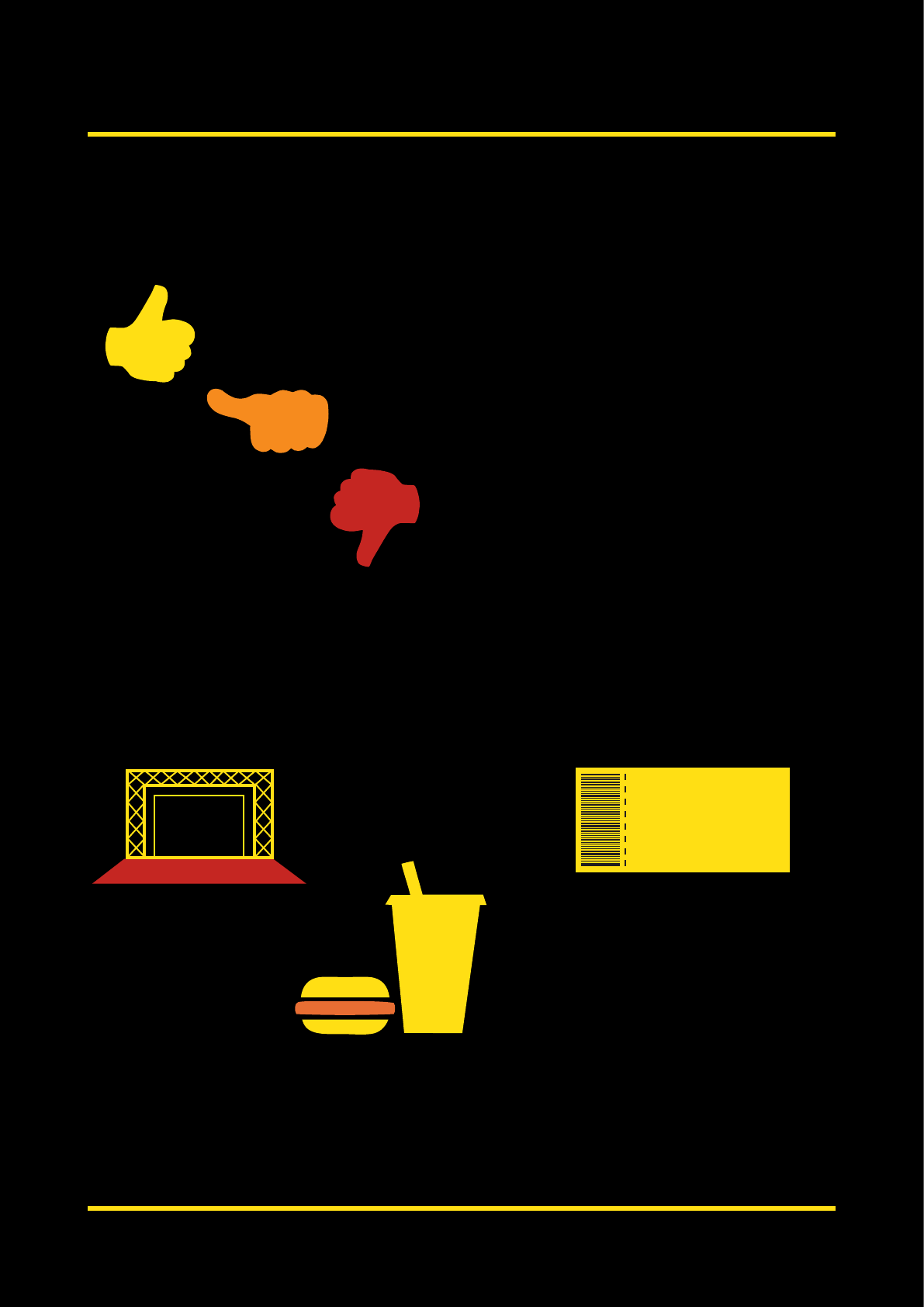
9
Public perception of the situation
We asked people if they felt that the situation for Deaf and disabled customers when
booking access for live music had changed in the last four years:
Value to the industry
On average, the 349 Deaf and disabled people represented in the Access
Booking Survey had:
This represents £250,000 of income for the live music industry.
3.3 million Deaf and disabled people go to live music events every year.
£30
on food,
drinks
and
merch.
Spent
Spent
on a gig
ticket.
9
Gone to
gigs or concerts in
the last year.
37
%
thought it had improved
9
%
thought that it had got worse
thought that it had stayed the same
37
%
£48

10
Beforewedelvedeeperintooursurveyndings,itisimportanttoplacethemincontext.
A strong foundation
The two aims of our 2014 report were to work with the Society of Ticket Agents and
Retailers (STAR) to establish a working group to examine the access booking process,
and to support the development of a proof of access requirement system to facilitate this
booking. Both of those aims have been achieved and serve as a strong foundation to
build upon.
The STAR Accessible Ticketing Group
The STAR Accessible Ticketing Group has met over the past four years as members
have worked on developing their customer service models. The culmination of this
group’s work was the publication by STAR in 2017 of ‘Making Ticket Sales Accessible
forDisabledCustomers–ABestPracticeGuide’,writtenbyNimbusDisability.This
guide explores the legal context, issues relating to point of sale accessibility, and
evidencing disability. This report is designed to complement that guide by shining a
light on the impact of not meeting the needs of customers wishing to book access, and
identifying the areas that require further development across the industry.
Download the guide here: www.star.org.uk/accessibleticketingguide
“In response to the 2014 State of Access Report, STAR formed its Accessible Ticketing
Group to discuss obstacles and solutions to improving ticketing for disabled people.
These discussions with ticket agents, systems providers, venues and promoters have
helped promote change and led to the publication of our Accessible Ticketing Guide in
2017. There is still much to be done and we therefore welcome the Ticketing Without
BarriersCoalitiontohelpbringaboutfurthersignicantandnecessaryimprovements.”
Jonathan Brown, Chief Executive, Society of Ticket Agents and Retailers
Proof of access requirements
A proof of access requirement system has also been established since the launch of
the 2014 report, with input from members of the STAR Accessible Ticketing Group.
The Access Card, developed and delivered via a social enterprise set up by Nimbus
Disability, has been publicly accepted as a form of proof by 181 live events venues
(including music, theatre and sport) and a total of 359 diverse businesses across the
UK so far, with over 10,000 Deaf and disabled people signing up. The card is also
increasingly accepted at a wide range of other venues that have not yet informed
Nimbus directly. Only two ticket companies formally accept the card at the present time
–TheTicketFactoryandTicketmaster.
Context

11
Emerging best practice
As we will highlight in the body of this report, there are multiple examples of best
practice that have been developed over the past 4 years across the live music industry.
In many cases, STAR members and our own Charter venues have been at the heart of
positive developments, serving as examples for the wider industry. Participants of our
survey named over 70 individual music venues and festivals who they felt had delivered
an excellent service in terms of facilitating access booking. This is a testament to the
good work currently being done across the UK. People also highlighted good work
being done by venue chains, theatres and football clubs.
The main reasons given for praise were:
•
The existence of an access scheme
•
Accepting the Access Card
•
Being able to book access online
•
Choice and number of accessible spaces available
•
Flexibility when booking access
•
Friendly and understanding phone line staff
The following venues and events were praised by customers in our Access
Booking Survey:
Academy Manchester
Apollo Manchester
Arena Birmingham
Barbican
BBC Radio 2 Festival
Birmingham Symphony Hall
Boiler Shop
Borderline
Brighton Centre
Brighton Dome
BST Hyde Park
CityHallShefeld
Colston Hall
Craven Cottage
Echo Arena Liverpool
Edinburgh Fringe Festival
Edinburgh International
Festival
Electric Brixton
Ethiad Stadium
First Direct Arena Leeds
G Live
Genting Arena
Ground Control Events
Hammersmith Apollo
Hampden Park
Islington Assembly Hall
Kings Place
Koko
Leeds Town Hall
Liverpool Echo
Liverpool Echo Arena
Liverpool Philharmonic
London Stadium
Lowry
mac Birmingham
Manchester Albert Hall
Manchester Apollo
Manchester Arena
Manchester City
Metro Radio Arena
Newcastle
Millenium Centre Cardiff
Motorpoint Arena Cardiff
Motorpoint Arena
Nottingham
O2 Academy Brixton
O2 Academy Islington
O2 Ritz Manchester
O2 Shepherds Bush Empire
Plymouth Pavillon
Principality Stadium
Roundhouse
Royal Albert Hall
Royal Festival Hall
Royal Opera House
Sage Gateshead
Southbank Centre
SSE Arena Wembley
SSE Hydro Glasgow
Symphony Hall Birmingham
The Art School Glasgow
The Assembly Halls
Tunbridge Wells
The Brighton Centre
The Cliffs Pavilion Southend
The Eden Project Live
Sessions
The Lowry
Tramshed Cardiff
Tunbridge Wells Forum
Twickenham Stadium
Union Chapel
Waterfront Norwich
Watford Colosseum
Wembley Stadium
Wireless Festival
Wolverhampton Civic Hall
Wylam Hall
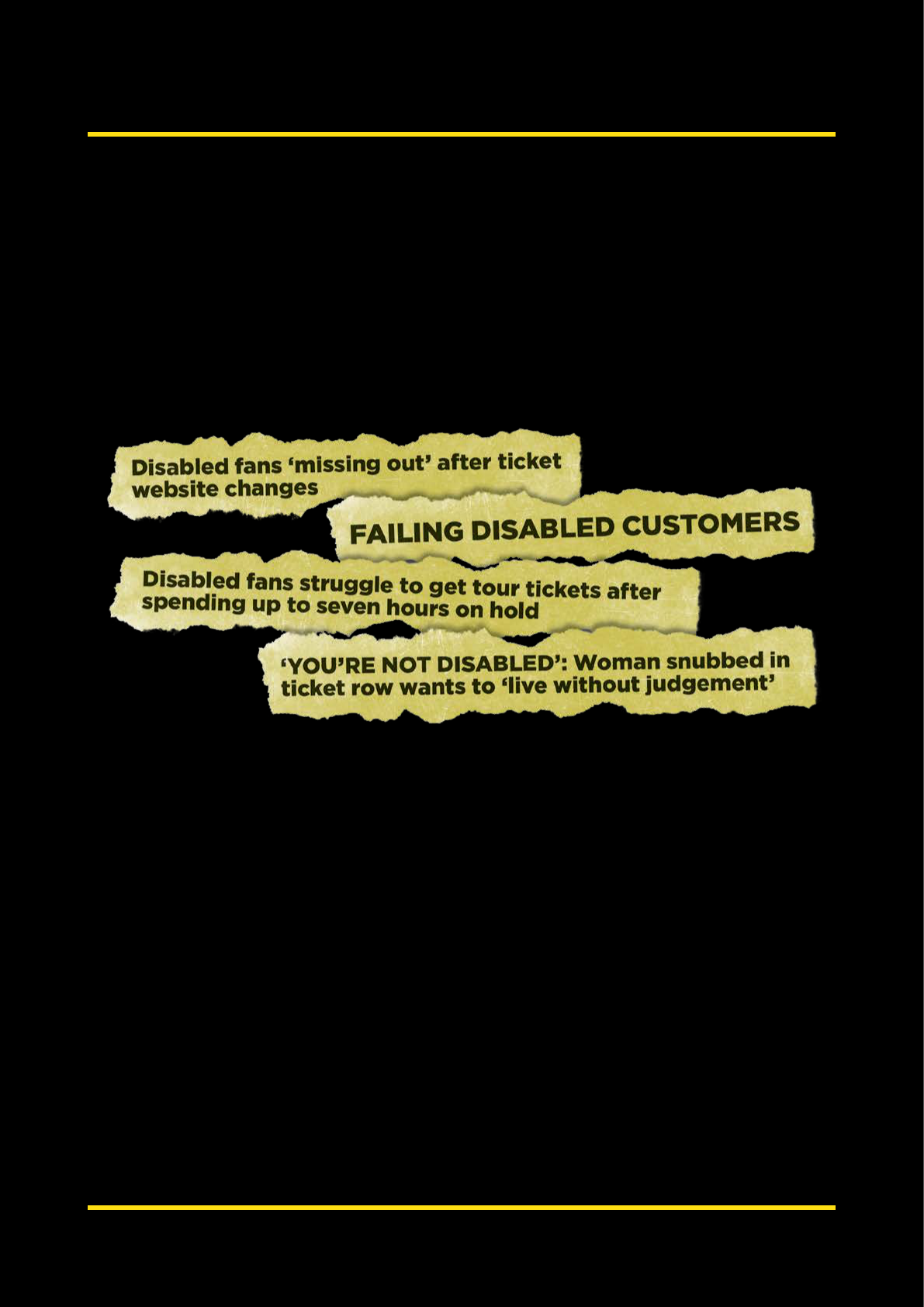
12
Negative press
Over the past few years we have tracked what seems to be a growing issue for the
industry - music fans feeling disgruntled with ticketing systems, and this leading to bad
PR and reputational damage.
In an age of social media, it does not take much for a negative customer experience
to turn into a PR issue, transformed from an individual complaint into negative press
that impacts customers, venues, events and artists. This certainly applies when people
encounter issues when attempting to make access bookings.
Here are some quotes from recent headlines:
Nothing puts people off more than stories of alleged poor customer service and
discrimination. Beyond the issues that people may experience, we are deeply
concerned about the impact of bad press on the decision making of potential Deaf
and disabled audiences. The current drip-feed of negative stories concerning access
bookingsformajorshowsoftenpaintsanoverly-simpliedpicturethatdoesadisservice
to both Deaf and disabled people and the music and ticketing industries.
Barriers and perceptions
Whilst this report examines negative customer experiences, it would be remiss of us to
not also shine a light on some of the hidden realities faced by the industry that feed into
these experiences. Whilst disabled people can certainly still face discrimination when
seeking to access live music, in some cases the reality is more complicated, involving
multiple parties including non-disabled fans abusing systems set up in good faith.
Aswewillshow,manydisabledpeoplehaveencounteredsignicantbarrierswhen
seeking to book access. At the same time, there are cases where there is a perception
of discrimination that might not match a reality hidden from the public. The factors that
lead to these perceptions need to be tackled by the industry as seriously as removing
the very real and often entirely avoidable barriers that remain.

13
A recipe for confusion
Booking tickets for live music can be confusing. Booking access can be doubly confusing.
In2018,customersndthemselvesdealingwithacomplexlandscapewhenitcomesto
booking tickets for bigger shows. There are many examples of companies working hard
to simplify processes. However, taken as a whole, the diversity of systems and policies
put in place by different venues and ticketing companies simply sows confusion:
•
Different venues and events having their own evidencing policies.
•
Tickets being sold by multiple companies, but only one of them handling
access bookings.
•
Third party ticket websites not signposting where to make access bookings.
•
Access telephone lines and email enquiries going straight to third party access
booking handlers rather than to venue or event organisers.
•
Customer service staff for companies handling access bookings not being aware
of other ways of booking.
Terminology
Another component of customer confusion is the terminology used to describe
bookable access.
Across the industry, ‘disabled tickets’, ‘access tickets’ or ‘accessible tickets’ are
increasingly advertised and bookable, which is in one respect a very welcome trend
butalsoconfusing.Theseadvertisedticketsusuallyrefertoaveryspecicreasonable
adjustment - a space in a dedicated area of step-free seating or wheelchair-accessible
spaces, or in the case of outdoor events, a space on a viewing platform. Some single
day outdoor events and venues package this bookable space with an automatic
additional space for a PA, others don’t. PA tickets themselves can be referred to as
‘Carers Tickets’, ‘Free Tickets for Personal Assistants’ and ‘Essential Companion
Tickets’, to name three variations. We advocate the use of ‘Personal Assistant Tickets’.
Due to venues and single day events having set capacities of accessible seating
positions (a debate in and of itself), these spaces can often sell out, resulting in ticketing
pages stating that ‘Accessible Tickets’ have sold out. With priority often given to ‘Access
Tickets’ in online information, it can be hard to determine what to do if you simply require
a PA in a standing crowd when tickets are still on sale.
When there is a lack of clarity, customers take this to mean that an event has placed a
hard limit on the number of disabled people who can attend, especially if they land on the
ticketingpagerstandsee‘AccessTicketssoldout’.Theendresultisconfusion,customers
missing out, and a very real sense of being discriminated against. Beyond this, the simple
fact that venues and events use different terms for the same thing creates additional,
unnecessary complication for customers that we wish to work with the industry to remove.

14
Lack of flexibility
Another common issue that we wish to support the industry to overcome is the lack
ofexibilityoften‘hard-coded’intoaccessbookingsystems.Aclassiccasewas
highlighted by our survey:
“Staff said that I needed to pre-register to claim a PA ticket, but became utterly
ummoxedwhenIsaidIdidn’twantaPAticket,justtobesafe[onaviewing
platform].Theycouldn’tworkouthowtodoit!”
Changes in requirements concerning ID can also have an unintended impact on Deaf
and disabled customers:
“For some venues you need to give the name of the person and carer when you book
as this goes on the ticket and you have to take ID. This can be months before the
concert,andsometimesyoudon’tknowwhothecarerwillbethatfarinadvance.”
Another topic that needs to be examined by venues is the process by which ‘accessible
seating’isclassied.HavingaveryrigidsystemforthisandfortheallocationofPA
tickets can lead to the choices of Deaf and disabled fans being limited, and what
‘accessible’ space there is being taken up unnecessarily:
“SomevenueshaveseatsI’veidentiedasaccessible[forme]-buttheyaren’t
available to me because they aren’t designated as accessible. Even if I manage to
bookthem,I’mdeniedaPAticketbecausetheseatisn’tclassedas‘accessible’.”
The impact of this type of policy is people simply being unable to attend:
“[Iwastoldthat]IcouldonlygetafreecarerticketifIusedthewheelchairplatform
buttheticketsforthatwereallbookedsoIcouldnotattendthegiginalocalvenue.”
Dancing around the Equality Act
Finally, with respect to meeting the legal duties of service providers according to the
Equality Act 2010, there remains a mixed picture across the live music industry.
Many venues and events have moved beyond basic reasonable adjustments to improve
access for customers in impressively creative and collaborative ways.
On the other hand, there are venue and event organisers now being left behind as they
continue to enact outdated and potentially discriminatory policies that impact the ability
of Deaf and disabled people to access the paid-for services they provide.

15
Venue access schemes
82% of people surveyed said that if a venue or event had a system that allowed them to
pre-register access requirements in order to speed up the access booking process, they
would sign up. Only 2% said they would decline, the remaining 13% being unsure.
When we asked people if they were members of any existing schemes:
•
46% of people said that they were members of at least one venue access scheme.
•
54% had not signed up to any yet.
Data protection-compliant access schemes are enshrined at the Silver level of our
Charter of Best Practice for good reason. They enable customers to agree to have a
record of their details and access requirements stored, along with the date on which
they submitted evidence. In setting this up, the need for customers to resubmit evidence
and requirements each time they book (and for organisers to process this) is removed.
Everyone benefits
Thebenetsofhavinganaccessschemearemultiple,andextendbeyondthebenets
tocustomers–althoughtheseareprofound:
“AMGhaveanexcellentservice[that]speedstheprocessupandtakesaway
anyanxietythatsomeonemaydecideIamnotentitledtowhatIneed.”
Beyond customers, the customer service, audience retention and back-end
administrativebenetsforvenuesandannualeventsareobvious.
Before booking
“Youknowthey’rethinkingaboutaccessanddisabilityaspartoftheircustomerservice”
“Nothavingtorepeatedlysubmitinformationofproofofdisabilityisamassivetimesaver.”
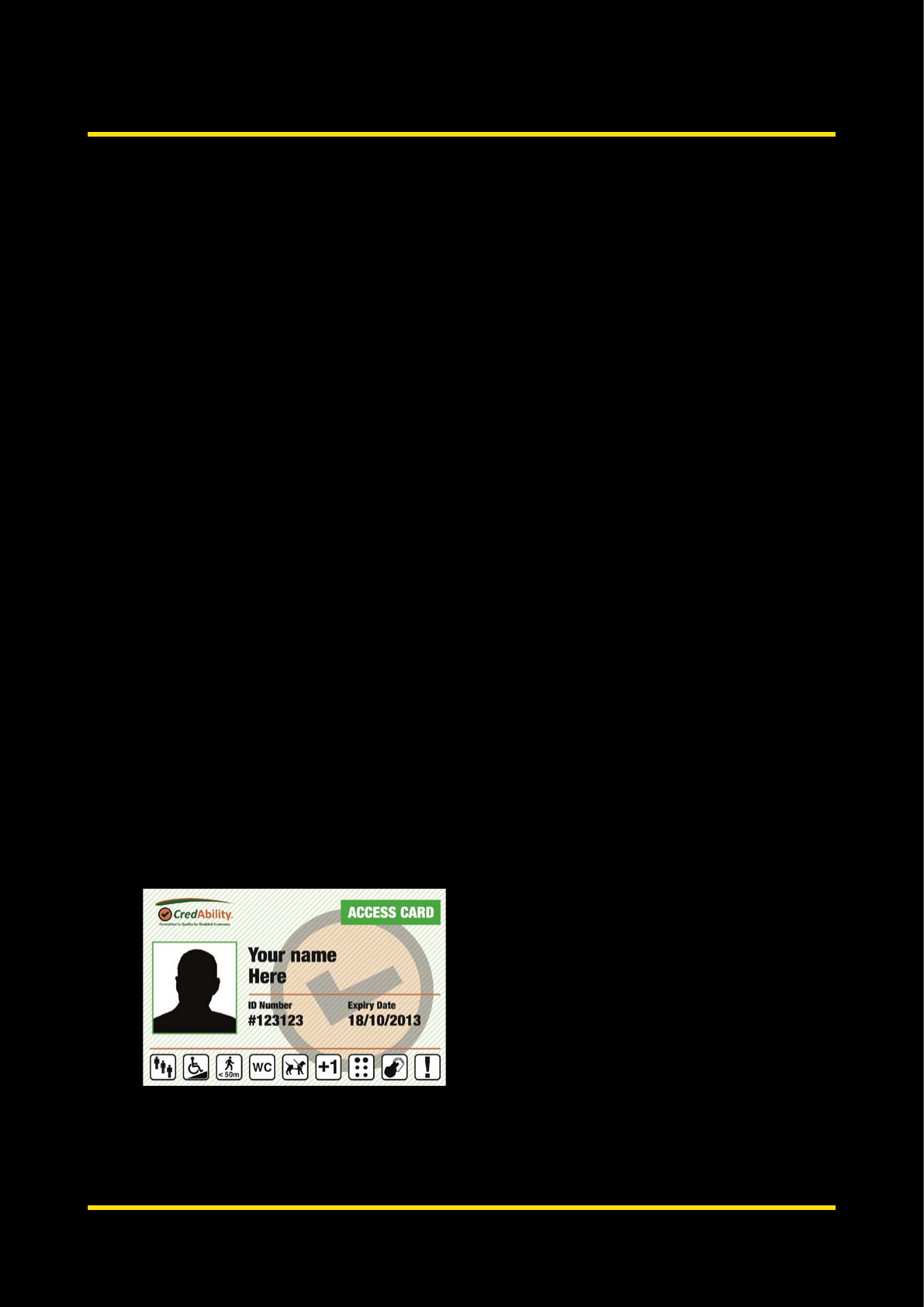
16
Proof of access requirements
We have elected to use the term ‘proof of access requirements’, in place of ‘proof of
disability’,becausetheformermoreaccuratelyreectswhatwearetrulytalkingabout
when it comes to access to live music.
The concept of ‘proof of disability’ is a complicated and loaded one, that all too often
endsupbeingreducedtowhetherornotsomeoneisinreceiptofparticularbenets.
There is also the lingering notion that people can be ‘registered disabled’, with
businesses across the UK still asking for proof of this, despite it being a long defunct
system that originated in the early 1970s and effectively ended with the arrival of the
Disability Discrimination Act 1995.
The live music context
In terms of the music industry, it is reasonable to request proof of access requirements
whenprovidingareasonableadjustmentthathasacostattached–suchasprovidinga
ticket for a Personal Assistant.
There is now a well-established framework with which venues and events should seek
to determine if someone has a valid claim to such adjustments, enshrined in our Charter
of Best Practice, and mirrored in STAR’s ‘Making Tickets Sales Accessible for Disabled
Customers’ guide.
Beyond individual venues and events getting up to speed with evidencing disability and
putting systems in places such as Access Schemes, a key arena for industry innovation
in this area is the recognition of an external proof of access requirements card
scheme that organisers can accept in place of having to process the bulk of evidence
gathering themselves.
The Access Card
“[It’s]madelifesomucheasieratthevenuesthatIgotoregularly.”
19% of people who completed the Access Booking survey held an Access Card.

17
The Access Card, developed and delivered via a social enterprise set up by Nimbus
Disability, currently costs £15 and is valid for three years. The scheme translates
member’s access requirements into symbols that indicate the reasonable adjustments
theyrequire.Thelong-termaspirationistondasustainablefundingmodelwhich
removes the cost to members.
As highlighted earlier in this report, the Access Card has been publicly accepted as a
form of proof by 181 live events venues (including music, theatre and sport) and a total
of 359 diverse businesses across the UK so far, with over 10,000 Deaf and disabled
people signing up.
Other schemes
Another highly successful scheme that is exclusively focused on access to live arts in
Wales is the Hynt Card. This is an Arts Council of Wales-funded initiative managed by
Creu Cymru in partnership with Diverse Cymru. Hynt is a free membership card that
currently entitles holders to a ticket free of charge for a personal assistant or carer at
participating theatres and arts centres in Wales. Launched in March 2015, the scheme
now has over 10,000 members and 40 participating venues, who invest in the scheme
inreturnfortraining,branding,administrativebenetsandaccesstolearningtripsto
other venues.
The third major scheme in the UK that caters to cinemas only is the CEA card, set up
in 2004 by the UK Cinema Association. This card also focuses on individuals obtaining
a PA ticket. Around 90 per cent of UK cinemas support the scheme from the large
national chains to smaller independent operators, with over 135,000 people currently
holding a card. The CEA card costs £6 and is valid for one year.
The benefits to consumers
Thebenetstomusicfansofaproofofaccessrequirementscardarebestillustratedby
the following quotes about the Access Card from the survey:
“Idon’thavetodisclosepersonalinformationeverytime.”
“It’sgoodforpeoplewhodonothaveordonotwanttogiveoutbenetletters.Italso
meansIdon’thavetogiveoutcondentialorpersonaldocumentslikedoctorsletters
asproof.”
“[Ihavenotbeenableto]obtainabluebadge,buthavemobilityissuesthatwould
prevent me from attending music events without access to disabled toilets, no
queuing and other issues. The Access Card has given me the evidence needed to
obtain these and I have now been to various events that would otherwise have been
impossibleforme.”

18
Online integration
“The Access Card has been amazing, I just wish more venues linked with them for
onlinebookings.”
It’s clear to us that there is massive potential for online integration of a UK-wide proof of
access requirements card at the point of purchasing tickets and booking access. Some
work has been done towards this over the past four years.
The Ticket Factory API integration of Access Card
“The Ticket Factory (TTF) is dedicated to improving the customer experience through
technological innovation. We were approached by the NEC Group’s Genting Arena
and Arena Birmingham to develop a service that would improve the ticket booking
experience for disabled customers. A pioneering partnership with Nimbus Disability
followed, allowing disabled customers to book tickets online with ease through TTF’s
website using their Access Card. This provides a seamless booking experience and
negates the need for disabled customers to call the agent and arenas’ contact centre
and share personal medical details over the phone to verify their access requirements.
TTF’s integration of the Access Card’s nationwide data into its technology systems
generates an instant understanding of each customer’s access needs. In 2017/18,
we processed nearly 5,000 access bookings for NEC Group Arena events using
thistechnology.”
Richard Howle, Director of Ticketing, The Ticket Factory
One card for everything
WeareofthermopinionthatDeafanddisabledconsumersultimatelyneedasingle,
free (funded), universally-accepted and cross-sector proof of disability scheme, which
captures the nuances of people’s access requirements and includes people who do
notreceivedisability-relatedbenets.ThiswishwassharedbymanyintheAccess
Booking survey:
“TheissueisthatIhavegotaboutvecardsfordifferentvenuesandaseparateone
for the cinema. Two cards I had to pay for. There should be just one card system that
is universally recognised by every arts, culture and sports venue, cafe, restaurant etc
-basicallyeverythingyouwanttodo.Thenlifewouldbeeasy!”
At the same time, it is important that the industry continues to accept other forms of
evidence, and not make access bookings solely dependent upon joining a card scheme.
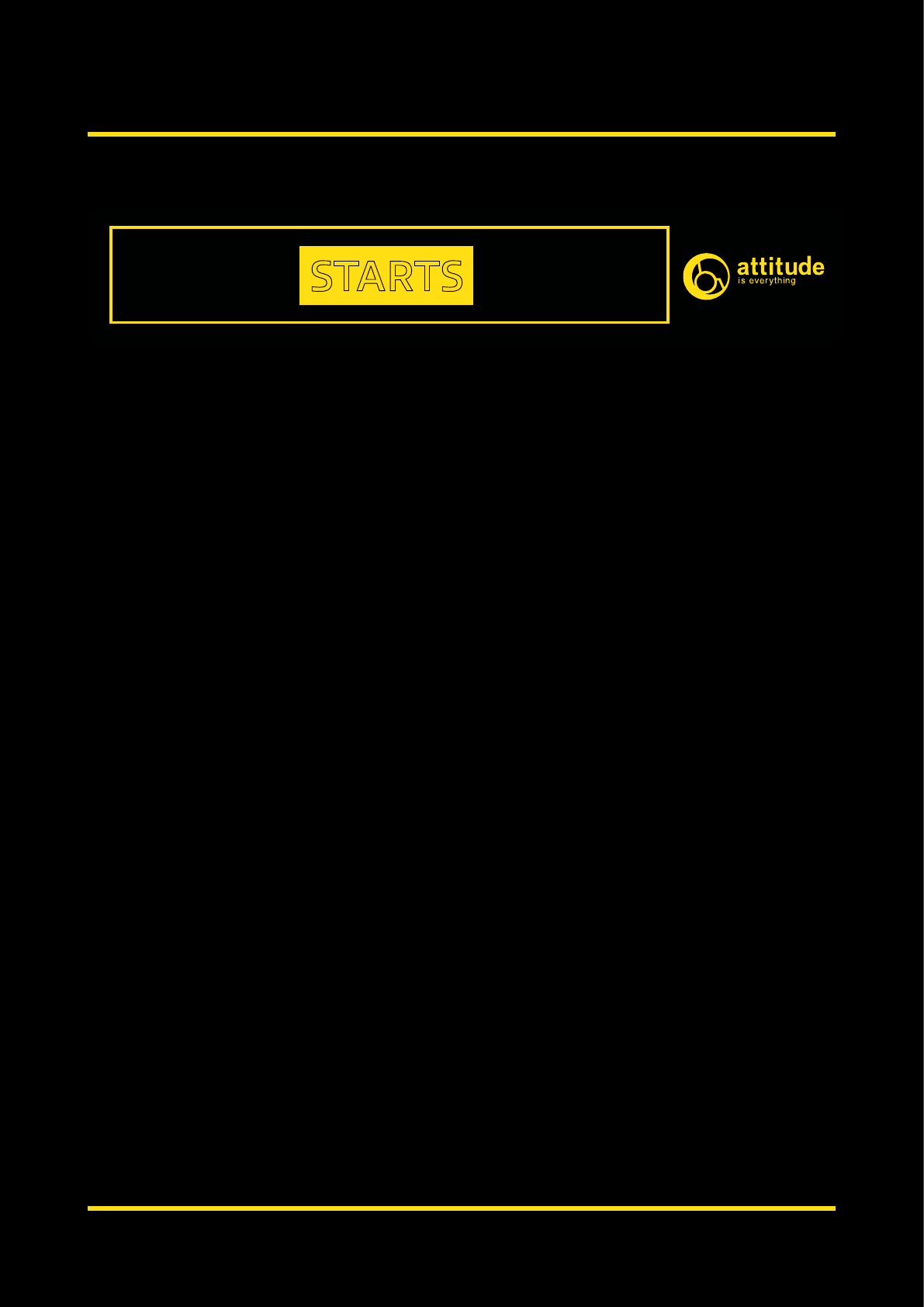
19
Access information
In our 2016 State of Access Report, we focused in on the critical importance of
comprehensive access information for Deaf and disabled customers. We published
guidance on what to include as part of our Access Starts Online campaign. Two years
on, this topic is as relevant as ever.
76% of people completing the Access Booking Survey had been put off booking tickets
due to lack of access information about a venue or event.
Access information and access booking go hand in hand. As well as being a key part of
customerdecisionmakingandcondencebuilding,itdoublesasessentialinformation
for internal and external ticket sales staff. When there is a breakdown of information,
everybody is impacted.
An issue that needs to be collectively addressed by the industry is the way in which the
availability of information can depend on the customer ticket-buying journey.
All online locations selling tickets to a venue or event should be signposting people to
accessinformationandagginguphowtomakeaccessbookings.Thisisparticularly
important where there are multiple sellers but only one handling access-related
ticketing, and an example where business competitors need to signpost to each
otherforthebenetoffans.
“OnebigproblemisndingoutHOWtobook-infoisoftenhiddenawayandnotobvious.”
ACCESS STARTS ONLINE
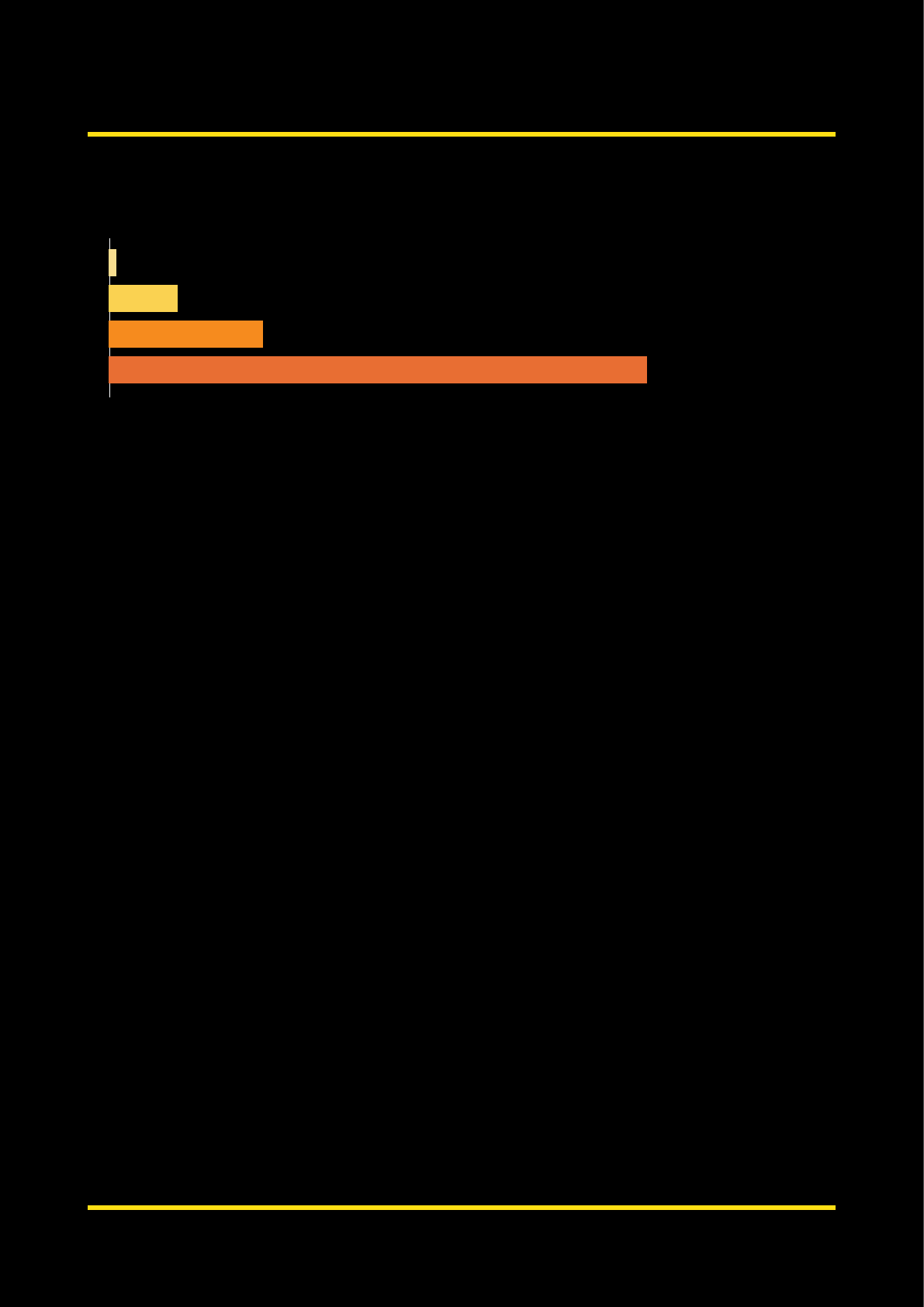
20
If given the option, survey respondents said that they would prefer the following method
for booking access:
Booking face-to-face
We will not focus on face-to-face booking in this report. However, venues and events
withphysicalboxofcesdoneedtoconsiderthephysicalandsensoryaccessibilityof
these locations, discussion of which can be found in our Charter Toolkit.
Booking by email
47% of people reported having faced problems booking access via a venue or event’s
access email address.
Itgoeswithoutsayingthatcustomersvalueconrmationoftheirticketbookings.Thisis
even more the case when it comes to access booking. Whilst email is primarily a means
of communication in the booking process, it can play a crucial role, particularly when
making bookings over the phone is not accessible to people.
Despite email being the preferred means of communication for some people, things
don’t work out well for customers when systems break down and this isn’t taken
into account:
“Accessinfoisnotalwaysavailableandcanbedifculttondonline.Onetimewhen
I found the access information, the instruction was to contact the access enquiries
by email or phone to make an access request. I mentioned in my email that I’m Deaf
and unable to use the phone. In their response, they provided one option which was
tophonethearena’saccessteamtobookthetickets.”
Booking methods
“[With]anemailIcanprintoffconrmationofmyrequirementsandinstructionsfromstaff.”
Over email
Over the phone
Online
Face-to-face
1%
9%
20%
70%

21
As with phone lines, for access bookings to be dealt with effectively over email, there
needs to be a rigorous approach to ensuring that staff are fully briefed on this method. If
not, the result is poor customer service:
“I tried to book tickets through an email address (as the venue’s own website said to
as an alternative to calling up the expensive access line), only to have a member of
staff call me in confusion because he had no idea about accessible seats. I explained
what the website said and he did book my seats in the end, but he didn’t know that
waspartofhisjob,andhecouldn’trecommendthebestlocation[tomeetmyneeds].”
We have also been contacted by fans who have contacted an event about access, thinking
they were reaching out to the organisers, when in fact their emails have gone straight
throughtoaticketingcompanyhandlingspecicformsofaccessbooking–forexample
the ticket allocation for a viewing platform. If third parties are dealing with all access
enquires on behalf of an event or venue, they need to be able to answer all questions and
signpost when people have other access booking needs that they cannot handle.
Booking by phone
“When staff are well informed, it is good to speak to someone on the phone to
conrmmyaccessrequirementsareunderstood.Speakingtosomeoneonthe
phone is a good gauge of how ‘access savvy’ a venue and its staff are. Speaking to
afriendlyandhelpfulmemberofstaffmakesmefeelcondentinattending.”
270 people had booked access over a phone line (77% of respondents).
71% felt that they had experienced issues when doing so.
Booking access over the phone is the primary method offered to Deaf and disabled fans
at the present time. Whilst this remains the case, there are a number of issues that still
need to be ironed out by the industry as a whole, set against beacons of best practice.
The preferred choice of some…
“Ialwaysusethephoneasmypreferredmethodtoensuremyneedsareunderstood.”
1/5 of people said they would prefer to speak to a person over the phone when
booking access, demonstrating that online booking should never be the sole means of
booking access.
This relates to another key intervention any venue or event can implement to improve
customerserviceforDeafanddisabledpeople–theallocationofadesignatedteamor
person to deal with access enquires:
“On the whole I think speaking to a designated department at the venue is brilliant.
Youfeelmoresecureaboutthefacilitiesbeingavailablewhenyouarrive.”

22
Significant barriers for others…
Booking over the phone was accessible for 76% of respondents, but posed a variety of
barriers for the remaining 24%.
Someofthepersonalreasonsgivenforndingphonelinesinaccessibleincluded:
•
Having a hearing impairment and/or issues with assistive technology when
interacting with numbered dial pads or voice command options.
•
Havinganeurologicalimpairmentthatresultsindifcultycomposingspeech.
•
Health dictating the time at which it is possible to make phone-calls on sale days.
•
Speaking on the phone being a serious trigger for a mental health condition.
•
Phone conversations demanding extensive recovery time afterwards.
•
Lackofcondenceduetoacommunicationimpairment.
•
Health conditions making holding a phone or dialling numbers painful.
People also reported being anxious about being judged about access requirements,
having had bad experiences previously that put them off future attempts:
“My medication can have a profound affect where speaking to someone I can
becomeconfusedandsound“drunk”.ThishasresultedinmebeingtoldIwasa
crankcallandhavingthelinecut.”
“I use the Text Relay service for Deaf people but often get staff who just hang up the
call-sofrustrating.”
“I have Tourette’s syndrome and can’t access many voice automated systems. I also
experienceunpredictablereactionsfromphoneoperators.”
“I was in the access booking line queue for over 45 minutes. Once through to an
operator,mystammerhadsignicantlyworsenedandIwashung-uponbythecall
taker within 20 seconds as she stated she could not understand me. I believe this
wasduetomydifcultyinformingmywordsafteralongperiodinthequeueand
could, and should, have been alleviated with patience on the part of the call-taker -
especiallyinlightofthecallbeingonthededicateddisabledaccessbookingline.”
The end result of people facing the sometimes unavoidable barrier of having to book by
phone is them missing out on seeing their favourite bands:
“Ihavetroubletryingtondtherightthingstosaytopeopleattimesoverthephone.
It can mean missing out on good tickets for big events which means I often just don’t
botherwiththem.”
11% of people who participated in the Access Booking Survey had considered legal
action. The main reason people gave was having to use a phone line to book when
standard tickets were available online.

23
Trying to get through
“Continualengagedsoundmeanslotsofcalls.”
63% of people reported having been on the phone for over 30 minutes at least once.
On big sale days, all fans trying to buy tickets can face long periods on hold or having to
repeatedly redial. As we highlighted above, there are various reasons why this in itself
mightposesignicantaccessbarriersformanypeople.
On top of this is the perception of unfairness that arises when people are given the
impression that there is single access phone line being operated versus a whole call
centre for general tickets. We think the industry could be more vocal about the way
these lines are staffed to alleviate these concerns.
There is also an elephant in the room rarely taken into account in press coverage
ofpeoplehavingissuesbookingaccessoverthephone–thesignicantissueof
non-disabled people phoning access lines at times of high demand, impacting the
experience for Deaf and disabled fans.
Ed Sheeran’s sell-out 2018 tour
“When Ed Sheeran’s 2018 tour went on sale on 8th July 2017, Ticketmaster experienced
its busiest ever day selling one million tickets across Europe. During the sale many fans
were so desperate to get tickets that they incorrectly and unfairly called the accessible
ticketinglineafterndingitonline.Thisresultedinover85,000callstotheAccessLine
duringthecourseoftheday,andover26,000madeinthersthour.Thenetworkwas
unable to cope with this level of demand and there were disruptions to the service.
We did everything possible to ensure we were providing accessible tickets to those
who needed them in a fair way. This meant calling some fans back and rejecting ticket
requests from those that did not need accessible tickets. As well as providing a free
telephone number for access bookings - a policy since 2012 - Ticketmaster has online
formsthatcustomerscanllintorequesttickets.Theseareprioritisedandtickets
putonholdonarst-come,rst-servebasis.Tooperatethesesystems,wehave
an extensive team of specially trained subject matter experts that have been with the
business for many years. We believe that having disability-aware staff with extensive
knowledgeofaccessinformationforalleventsandvenuesiscrucial.”
Andrew Parsons, Managing Director, Ticketmaster UK
Call preferences
We asked survey participants to imagine their local arena was consulting on its access
booking phone line. The results reveal a complicated picture.

24
49% said they would prefer to wait on the line in a queue to speak to an operator.
51% said that they would prefer to give their phone number and join a queue to receive
a call back.
Given this split, we think venues, event organisers and ticketing companies should
examine how to implement call-back options for all access booking lines, as this is
currently a rarity.
SSE Arena Wembley call back system
“Our call back system was set up over 7 years ago, when there was no other option but
to call the venue to make an access booking. The system means that the customers
are not hanging on the line waiting for an operator - although customers now have the
ability to book wheelchair-accessible spaces online via our website if they wish to. With
our voicemail system, the customer leaves us a message and we call them back in the
order that they have called. It means that we can dedicate additional time, as required,
to assess the customers’ needs within the venue and allocate the most suitable seating
for them. The voicemail can be adjusted, if needed, to let customers know that certain
seating for an event is sold out, or to provide event information regarding sales. We aim
tomakethebookingprocessaseasyaspossibleforallofourcustomers.”
Lyn Dicks, Deputy Ticketing and Box Oce Manager
Premium lines
A common theme in bad press related to access bookings has been people having to
book access via ‘premium’ phone lines. The situation with regards to phone line charges
is a complicated one. Some venues, events and ticketing companies use ‘premium’
lines, others use local rate numbers, and a third group provide free-phone lines for
access bookings.
53% of people said that they had been required to call ‘premium’ phone numbers.
6 people reported having had a bill of over £20 following an access booking.
If general tickets can be booked online without having to call, and calling a line with
charges is the only option for access bookings, Deaf and disabled people end up
incurring additional costs that non-disabled people don’t have to worry about. It is for
this reason that we urge the industry as a whole to adopt a free-phone policy for access
telephone numbers. In doing so, we understand that there are follow-on questions to
tackle, such as how to prevent non-disabled people accessing those lines at busy times.
We wish to work with the industry towards solutions to this problem. Facilitating online
access bookings is part of the answer.

25
Issues once speaking to someone
Getting through is only half of the story when it comes to making an access booking
over the phone. Sometimes getting though can be the end of the journey:
“I’vebeentoldtoringbackbefore[when]accessticketshadnotbeenregisteredon
thevenue’ssystem[despiteticketsgoingonsale].”
It should be standard practice in 2018 for access bookings to go live at the point of
tickets going on sale.
As highlighted previously, informed customer service massively impacts the experience
of Deaf and disabled fans when they get through on the phone and there are many
venues, events and ticketing companies getting this right.
However, our survey found that 47% of people had experienced staff on the phone
contradicting online access policies:
“Sayingtheydon’trecognisetheAccessCardwhentheironlinepolicysaystheydo.”
“Threedifferentstaffmembersalltoldmedifferentthings”.
Issues can also arise if third-party sellers are not equipped with relevant access
information:
“Lack of understanding, unable to explain system to get PA ticket from venue as they
can’tsupply…Manyalsodonothaveinformationtohandastowhomtocontact.”
“[Iwas]toldavenuewasaccessibleonlytondnoonehadtoldbookingstaffof
buildingworks.”
Some people also reported issues relating to basic disability awareness and
terminology–easilyrectiedwithDisabilityAwarenessTraining:
“I have been asked if I’m ‘registered disabled’ and what my ‘disability’ is. It is often
assumedthatIamawheelchairuserorhaveamobilityimpairment.”
“I called to say I needed to make an access booking. The question that followed was:
“Areyouawalkingdisabled?”Iwasabitstunnedbythequestion.WhenIeventually
saidyesaftersomeawkwardconversation,[theysaid]:“Someofthemwalk,some
don’t-youcan’ttellwhatitiswhentheycanwalk...”
Yet again, the end result of these avoidable communication issues are predictable:
“Some staff have not known how to book accessible tickets or log access
requirements.Onacoupleofoccasionsthishasledto[me]beingunabletoaccess
ticketsatall.”

26
Booking online
“It’ssomuchbetter!Muchfairer,fasterandeasiertodo.”
STAR’s Best Practice Guide on making ticket sales accessible points out that ‘most
major ticket sellers for entertainment now see well over 90% of their transactions online’.
We strongly agree with STAR that ‘there now needs to be a focus on giving disabled
customers the same opportunity of choice’.
With 70% of our Access Booking survey participants saying they would prefer to book
access online, it is time for the whole industry to make this happen as comprehensively
as possible.
The key things that we think should be bookable online in 2018 are:
•
Wheelchair accessible spaces, transfer positions and step-free seating.
•
PA tickets / seats in any location.
•
Locations for hearing loop / BSL interpretation / captioning / audio description.
In order for this to be achieved, Access Schemes need to be in place. Integration of
schemes such as the Access Card also have the potential to play an important role in
facilitating this next level of customer service.
“Good experiences have mostly come through systems that accept the Access Card
as it has my unique requirements on it. When I do it this way I feel like I have the
sameexperienceaseveryoneelse.”
Independence
We know that when booking shifts online, the ability of people to independently book
tickets increases dramatically:
“Itwouldbeusefultobeabletojustbookonline[myself]andnothavetoaskmy
husband to make the call for me, and explain my needs, every time I want to book a
concertorashow.”
At the same time, it is essential that ticketing websites themselves are designed to
be user-friendly and accessible to facilitate independent use. The industry makes
considerable use of splash pages and pop-ups with images overlaid with embedded
text–designdecisionswhichrenderinformationeffectivelyinvisibletosomeusers
using assisted technology:
“Websites for ticket booking are often not accessible for people with vision
impairmentsorforthoseusingmagnicationorscreenreaders.Thisispartlydown
totheamountofpictures,advertisements,tablesanddiagramswhichareused.”
“I have missed out on tickets for a few gigs recently as I sat on hold for over an hour, yet
mywifesittingnexttomewasonlineandabletogetnon-accessibleseatingticketseasily.”

27
Customer confidence
“Ifitallworked,Iwouldgobackmuchmoreinfuture.”
OurAccessBookingSurveydemonstratesthatwhilstasignicantnumberofDeafand
disabled people are prepared to trust online systems, there is still work to do to increase
consumercondence.Thiswillonlybesuccessfulifvenueandeventaccessinformation
andbriengofstaffonthegroundiswatertight,ensuringthatcustomersexperiencea
hassle-free experience at the event that matches the ease of booking online.
We asked survey participants to imagine they were going to a venue they hadn’t been
to before that allowed them to pre-register their access requirements and then book
access and tickets entirely online, without speaking to anyone.
45%ofsurveyparticipantssaidthattheywouldfeelcondentthattheiraccess
needs would be met on the night, dependent upon resources such as high quality
access information.
Only6%feltthattheywouldhaveverylowornocondence,whichisencouraging.
Whilst in the short term online access booking is likely to be restricted to certain access
provisions, there is no reason why this could not be opened up in the future as systems
become more customisable and the trust of Deaf and disabled fans is gained.
The following quotes illustrate the concerns people have currently, particularly when
their access requirements are more complex than simply requiring a PA or accessible
seating position:
“IwearaCochlearImplantandpreferto[sitinaparticularlocationinrelationto]
the stage, so without having any communication directly with the venue that can be
difculttodetermine.”
“Goingtoagig[isa]one-off,soifsomethingisn’tsuitable,mydaughterdoesn’thave
the option of going somewhere else. The experience is totally ruined and a complete
waste of time. We cannot take that risk. We need to be 100% sure that her access
requirementswillbemet.”
“No two people have the same access needs therefore the online system would have
to be very detailed or allow lots of free text to ensure the individual access needs are
understoodandsupported.”
What is very clear is the central role of clear and accurate access information in
facilitating online booking:
“Ifaneventhadaccessinfo[that]wasverycomprehensiveonline,Iwouldbe
condent.However,somevenueshavehardlyanyaccessinformationontheir
websitesanddonotengenderasmuchcondenceinmeintermsofaccessneeds.”

28
Regardlessofthemodeofbooking,Deafanddisabledcustomersneedconrmation
of access bookings. Online systems are tailor-made to provide this automatically, but
inmanycases,peoplesaidtheywouldpreferamemberofstaffto‘manually’conrma
booking to provide extra reassurance:
“Onlinebookingisthenewnormal.Solongasconrmationwasreceived,I’dtrustit.”
“I like the reassurance of knowing not just the seat location but the access to it, which
Ihaveneverseenonline.IfthiswasincludedIwouldbetotallycondent.”
“This would be the quickest and easiest way to book. A receipt of the requirements
thatIhadregistered,totakewithmeonthenightwouldmakemefeelfullycondent.”
“Iwouldexpecttobeabletobookaticket,andthenforsomeonetocallme[toconrm].”
Signalling an inclusive ethos
Setting up online access booking is one of the ultimate ways in which a venue, event
or ticketing company can signal to Deaf and disabled music fans that they are actively
inclusive and mindful of the need to provide an equal service:
“IthinkIwouldbeverycomfortable[withonlineaccessbooking],asthevenue
[would]seemtoknowwhattheyaredoing.Alsoitiseasierformenottospeakto
someoneonthephone,soperfectreally.”
“If they have this already integrated into their system, it means they have looked at
thisissueandsohopefullywouldhavethefacilitiesrequired.”
“It would show that they’ve thought about the fact booking via phone or in person
is completely inaccessible to a lot of disabled people and that we should be able to
bookonlinelikeeveryoneelse,whichwouldmakememorecondentintheirability
tofollowthroughonthenight.”
Roundhouse on their online access booking system
“Having worked with Attitude is Everything to become a Gold venue, accessible
online ticketing was a high priority for us. We are committed to ensuring our venue is
welcoming to all and fair access to tickets, including an online booking system, is part of
that. Wheelchair users can book online using the ‘select your own seat’ function on our
website and once the booking is complete we email the customer to let them know what
they have booked. We direct them to our online access information and arrange blue
badge parking if it’s needed. We are continually striving to improve our offer and are
lookingforwardtodevelopingouronlinebookingfunctionalityinthenearfuture.”
Claire Grin, Head of Operations, Roundhouse

29
Massive potential
The potential for integrating access booking into online systems cannot be
underestimated.
Beyond PA tickets and seating locations, there is a now a tremendous opportunity for
the industry to push things forward by building upon existing online seating plans and
providing additional information for every seat on sale in a venue, such as number of
steps to access the seat, and the distance to the nearest accessible toilet. Everyone
wouldbenet,includingthosewhomightnotrequireapositioninadedicated
wheelchair-accessible location, helping to free-up the often limited space set aside for
dedicated step-free ‘accessible’ seating positions.
We know from speaking to venues and ticketing companies that many have plans
to develop their services in this direction. Technological change does not happen
overnight, and with the best intentions, companies cannot instantly shift to facilitating
online access bookings to the extent that they might wish. We are, however, hopeful that
Deafanddisabledmusicfanswillencountersignicantupgradesintheironlinebooking
experiences in the near future given the commitment that already exists across the
industry to make improvements.
The four pillars of access booking
“I have never managed to buy a ticket solely using an online system. It has always
involvedfollowupemailsortelephoneconversationstocompletetheprocess.”
To conclude this section, it is clear that companies need to examine the ‘four pillars’
ofaccessbooking–face-to-face,email,phoneandonline–andensurethatall
are as accessible as possible, and interchangeable according to the needs of
individual customers.
Flexibility and customer service is key:
“The Roundhouse is very good. I booked a ticket to see a singer there a while
back, and their website allowed me to specify that I had access requirements. Very
shortly after that someone sent me an email explaining that the ticket I had booked
was in the stalls and asked if, given my disability, a different option would be more
accessible. I was given options and nothing was assumed. It was really very good
andIhadagoodtimeonthenightknowingthateverythinghadbeentakencareof.”
As we have shown, there are a variety of customer preferences when it comes to
booking. It is therefore essential that a ‘whole system’ approach is taken to ensure
seamless customer service. This includes accounting for the various ways access can
sometimes be bookable for the same show, and ensuring that internal and external staff
understand policies.

30
The basic transaction we have focused on in this report involves an individual disabled
person booking access for an event, which might include booking a personal assistant
ticketoraspecicseatingarrangementtomeettheiraccessrequirements.
However, there are a range of other scenarios that need to be considered, if Deaf
and disabled people are to be granted equal access to everything when it comes
to ticketing.
Booking for a party
“IfI’mgoingwithafriend,Ihavetobuymyticketsandtheirsintwoseparatetransactions.”
As we pointed out in our previous State of Access Report, people go to live music
events in groups, and that includes Deaf and disabled people.
People want and need to be able to book their access and tickets for other members of
their party at the same time. This is particularly important for Deaf and disabled parents:
“[Thereisoftenan]inabilitytounderstandthatsomedisabledpeoplehavechildren.I
was given an accessible seat and a PA seat but they wanted my 6 year old to sit the
othersideofthearea.[Theonlyotheroptionwastopay]thehighestseatpricesforall
threeofusasonlythefrontrowhadaccessibilityinadditiontotheaccessiblearea.”
High demand events
“I’vegivenuptryingtogotohighdemandevents.”
73% of people had felt discriminated against when trying to book access for a high
demand event.
As touched on earlier, it is this issue that has catapulted access booking into the public
eye in recent years. Whilst the ‘15 minute sell-out tour’ has become embedded in the
coverageofhighprolesalesasanimpressivefeattobemarvelledat,wethinkthe
resulting experience for all customers is less than ideal, and particularly so for Deaf and
disabled fans needing to book access along with their tickets. We need the industry to
work towards better solutions.
Theissueofnon-disabledpeoplephoningaccesslinestheyndonwebsitesisabig
one that clearly needs to be tackled. Bespoke pre-registration systems for customers
with access requirements might be one option to explore:
“Ifyoucouldregisteryouraccessneedsandthenreceive“priority”alertswhenyour
desired seating preferences were available before tickets were available on general
releasethatwouldbereallygreat.”
Beyond simple sales

31
If such systems were implemented, they would need to take into account those people who
might come across an ongoing sale after a deadline to pre-register access requirements
had passed, and ensure there was no risk of discriminating against them in the process.
With this in mind, we think another concept worthy of discussion across the industry is the
notion of shifting to pre-registration and lottery systems for all customers for big sales.
Pre-sales
“Ihadapre-salecodeforaparticulareventandwastolditwasonlyfor“normal”tickets
andwheelchairaccesswasonarst-comerst-servedbasisonthedayofsale.”
55% of people had faced problems booking access through a pre-sale or early-
bird scheme.
Pre-sales are another important area of ticketing where access can be overlooked,
potentially contravening the Equality Act 2010 by placing Deaf and disabled people
at a disadvantage.
This issue can be compounded by the issue of being unable to book for a party:
“You are unable to purchase standard and accessible tickets on the same order.
This is of particular concern during a presale event as the booking systems are
programmedtoacceptthepre-salelinkonlyonce.Ihavemissedoutseeing[one
ofmyfavouriteartists]becauseofthis.”
The role of artists and promoters
“I always sign up for pre-sales for my favourite bands and I have only ever been able
to get accessible tickets on one occasion. Pre-sale tickets are usually released by
the band/promoters through only one ticketing vendor. Accessible tickets are often
held at another vendor or the venue and not available to purchase through whichever
pre-salevendorthathasbeenused.”
Pre-sales are one of the key areas where we need promoters and artists to take
responsibility, liaise with venues and events, and ensure that access booking is facilitated.
If a Deaf or disabled music fan purchases something or joins a fan club to support their
favourite artist and access a pre-sale, this should be acknowledged by allowing them to
participate on an equal basis and arrange for their access requirements to be met:
“I’ve had more than one occasion where I’ve been part of a fan group and early
bird tickets have gone on sale and I’ve called the venue and not been able to book
access because the early pre-sale on the computer hasn’t listed access tickets. All
thewhile,otherfansarebuyingtheirtickets.”
“I’vehadpre-salecodes[afterhavingboughtan]album,onlytobetoldthatdisabled
[peoplewithaccessrequirements]can’tusethem.”

32
We also heard from people who had been assisted by bands, proving that this is
an issue that artists care about when they learn about it, and one that can be easily
rectied:
“For one event I eventually managed to get in contact with a member of the band
who sorted this out for me personally and has ensured that all of their future events
nowhaveaccessibleticketsonpre-sale.”
VIP and artist meets
“I’veneverbeenabletoattendanymeetandgreetsastheyareusuallyinaccessible.”
Another obvious area that involves promoters and artists alongside venue and event
organisers is the growing market for VIP and meet-and-greet packages.
75 people in our survey had faced problems booking access along with a VIP or artist
meet and greet package.
Basic physical barriers
For meet-and-greets to be made available on an equal basis to fans with access
requirements,theyneedtobeaccessibleintherstplace.Severalpeoplereported
examples of this not being the case:
“I’ve never been able to attend meet and greets because the ones I’ve been interested
inhavetakenplaceinpartsofvenuesthataren’taccessibledueto[concernsabout]
thebandbeingmobbedintheaccessibleparts.Noalternativewassuggested.”
Safety was cited in another example:
“We were then told that it was a safety issue to have someone with mobility issues at
ameet-and-greet.”
To the individuals involved, these arguments can often boil down to a sense of being
directlydiscriminatedagainst–anissuethatneedstobetackledhead-onforthebenet
of everyone:
“We already had our tickets to the concert and then the meet-and-greet tickets were
released. We hurried to get our tickets and were very excited. But we were turned
downatbecauseIuseawheelchair.”
Information and access policies
Meet-and-greet opportunities need to be promoted with bespoke access information, to
ensure that people can make informed decisions. Access policies also need to be carried
over, for example enabling people to attend with the support of a PA at no extra charge:

33
“I am keen to purchase meet-and-greets for various events however there is never
any access information for disabled people and I’m unsure whether I’d have to pay
extra for my carer. Information regarding this at meet and greets would be incredible
asinthepastI’vehadtomissoutasIcan’tndanyinfooranycontactstodiscuss
myconcerns.”
There clearly needs to be a policy adopted by every venue regarding how meet-and-
greets can be facilitated in a location that is accessible for all fans and integrated with
access bookings:
“I was denied VIP tickets as the venue or promotors didn’t know if my disabled access
ticket and companion ticket would qualify for the VIP upgrade. As they didn’t know, I
wasunabletomeetmyfavouriteartistandmissedoutontheopportunityofalifetime.”
Avoidable complexity
When people do manage to book VIP options factoring in their access requirements,
it is often after prolonged and confusing negotiations that would result in many people
giving up:
“Trying to access presale tickets with a VIP meet and greet option I spent over an
hour on hold to be told I had to ring the venue direct instead. The venue said I had to
ring their ticket supplier. The supplier could then only sort out my seats and I had to
sort out the VIP element with the venue separately. The venue said this was incorrect
andhadtocanceltherstbookingbeforetheycouldprocessthefullVIPticket.They
were very good and reserved my tickets whilst everything was being sorted out. The
wholethingtookoveraweektonalise.”
Adapting the package
There are several factors that need to be considered when ensuring equal access to VIP
packages.Often,specicseatingisincluded,thatinmanyvenuesmightnotalwaysbe
physically accessible. Whilst we encourage and support organisers to address this on a
case-by-casebasis,muchcanbeachievedbyadaptingpackagestoreectthelimitations
that may exist in the short-term. If this is done in an honest and customer-focused manner
in conjunction with promoters, fans are often very pleased and accommodating:
“Symphony Hall Birmingham bent over backwards for me when I tried to get a
VIP meet-and-greet last year. Part of the package included seating which was
not wheelchair accessible. In conjunction with the promoters they organised a re-
banding of the package to subtract the cost of the accessible seats from those on
the front row to compensate for the difference. I was able to enjoy everything else
associated with the VIP package as they moved the meet-and-greet area to an
accessible area. They also organised a blue badge parking space for me right next
totheentrancefreeofcharge.”

34
Gift vouchers
With multiple companies now offering entertainment gift vouchers, it is essential that the
industry ensures that these can be used by all customers, including Deaf and disabled
fans needing to book access. Unfortunately, this is currently not always the case:
“I’ve been told I cannot use gift vouchers to purchase tickets because the dedicated
bookingofcespecicallyasksdisabledcustomerstobookthroughtheminsteadand
then refuse to accept the vouchers meaning that I’m unable to spend my birthday or
Christmaspresents.”
Resales
“When there has been an event I’m not able to attend, I’m not aware of any way to
sell-on tickets to other disabled users. I’ve never tried to get a refund as I assume
thiswouldn’tbeaccepted.”
Finally, it is important to highlight the need for the re-selling of tickets linked to access
bookings to be facilitated whenever this is an option for other ticket holders. Getting this
right is even more important given the circumstances that some fans live with whilst
seeking to pay for and access live music:
“I have a higher chance of missing gigs due to a chronic health problem so I worry
aboutbuyingnon-refundableadvanceticketsasIonlygettogigsabouthalfofthetime.”
Across the UK, there are venues and events providing excellent customer service when it
comes to enabling refunds and resales of access bookings. However, there is still much to
do to support the whole industry to adopt best practice policies in this area.
64 people had faced problems re-selling tickets linked to access bookings.
This whole topic centres on fairness, and giving Deaf and disabled fans equal access to
all the privileges that non-disabled ticket holders have once they have purchased tickets:
“It’snotfairtoapply‘norefunds’toaccessibletickets.Ifsomeonecan’tattend[agig]
theycangive[theticket]toafriendnormally.Butifyouhaveanaccessbookingand
[youare]sickoranythingthennoonecanattendandyoucan’tgetarefundANDyou
can’t resell. This has happened to us and it’s an expensive and unfair way to do it. We
can’tjust‘givethemtoafriend’.”

35
Drawing upon data in the Department of Media, Culture and Sport’s Taking Part Survey
2015/16, we estimate that around 3.3million Deaf and disabled adults go to a live music
event in any given year - approximately 11% of the total UK live music audience. Their
experiences and perceptions matter.
Before we end this report with our vision for access booking and how we intend to work
towards it in collaboration with the music industry, it is worth considering the impact that
bad experiences of booking access have on the perceptions of Deaf and disabled music
fans when it comes to venues, events, ticketing companies and artists.
Poor access booking experiences impact everyone.
Apportioning blame
51% felt that the venue or event would be entirely to blame.
61% felt that ticketing companies (if involved) would be somewhat to blame.
17% felt that the artists performing at the event would be somewhat to blame.
Lasting opinion
92% said they would be left with a negative opinion of the venue or event.
86% said they would be left with a negative opinion of any ticketing company involved.
18% said they would be left with a negative opinion of the artist(s) they had tried to see.
Future decisions
81% said they would be less likely to go to the venue or event again.
76% said they would be less likely to book tickets through the ticketing company again.
21% said they would be less likely to see the band or artist live in future.
15% said they would be less likely to buy records or merchandise from the band or artist.
The impact of bad experiences

36
In our 2014 State of Access Report, we stated that if non-disabled people are able
to purchase tickets online, by telephone and in person, the same options should be
available to Deaf and disabled people.
We still stand by this assertion.
Some people wish to be able to book access completely online, others will always wish
tospeaktosomeoneonthephone,popintoaboxofce,orcommunicateviaemail.
Theyallhaveonewishthatanyoneworkinginthemusicindustryshouldrecognise–
to see their favourite artists play live.
The focus of this report has allowed us to present the voices of Deaf and disabled
fans regarding the single most important customer service issue that impacts them.
By sharing extensive quotes, we hope to communicate a sense of the massive and
often un-tapped consumer group that is out there, asking the industry to embrace
their custom and recognise what they need in order to be granted an equal service.
Therehavebeensignicantadvancesacrosstheindustryinrecentyears.Thereare
also sections of the live event world being left behind by competitors, and failing to
make the reasonable adjustments they are legally obliged to provide.
With discussion of ticketing comes the topic of competition - by its very nature the
name of the game is to attract customers over competitors and secure their custom.
Whilst we embrace a competitive spirit when it comes to pushing the boundaries of
live music accessibility, the key message of this report is that the industry now needs
to collectively agree a baseline set of standards when it comes to the implementation
of access booking.
We need promoters, managers and artists to join venues, events and ticketing
companiesintacklingthisissueandndingsolutionsthatworkforeveryone.
Let 2018 be the year in which the industry joins forces to begin a step-change in
access booking.
Conclusion
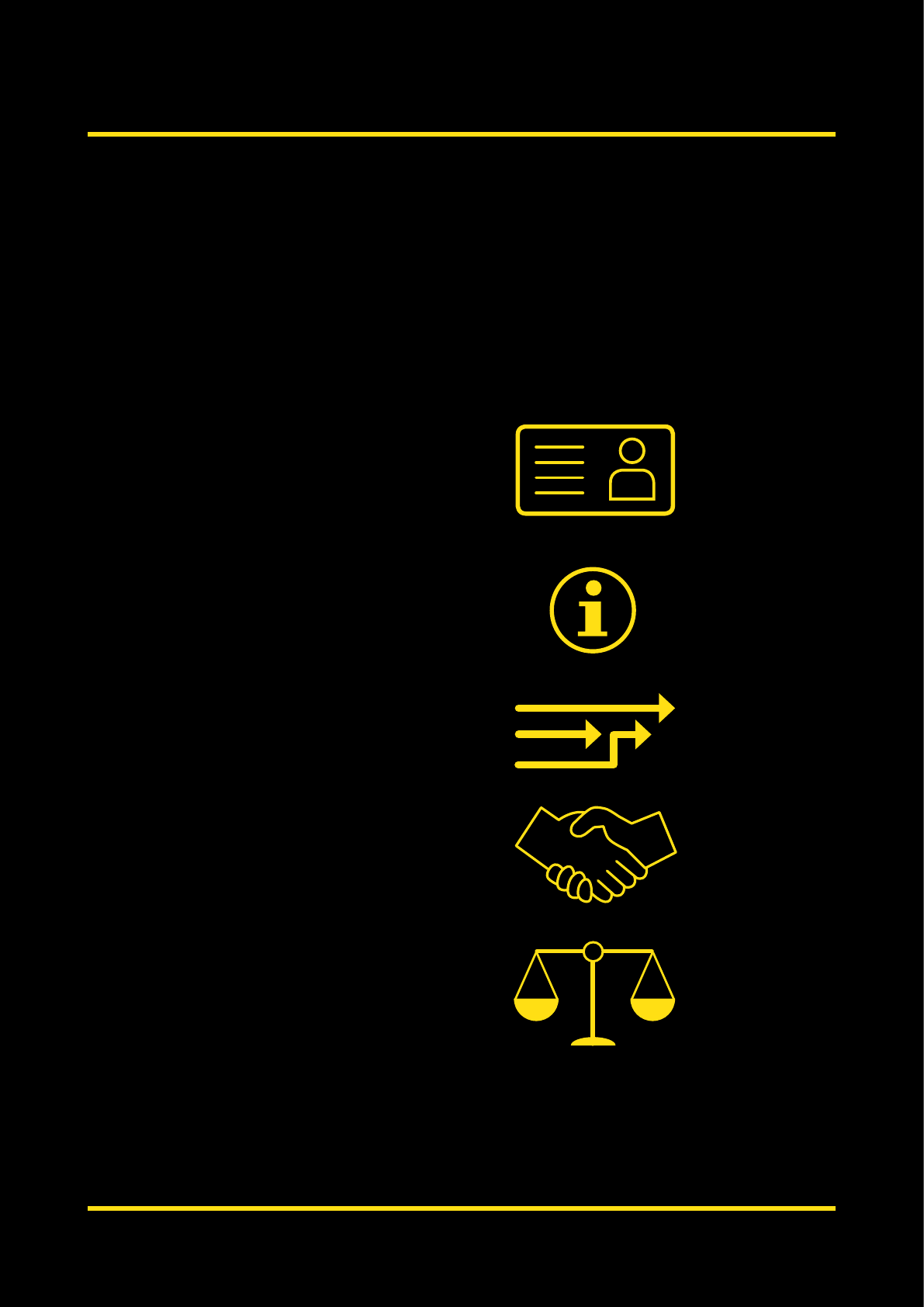
37
When we talk about Deaf and disabled music fans, we include many of our own staff,
trustees and all of our volunteers.
As a disability-led organisation committed to sharing the voices of fellow Deaf and
disabled people, we are a unique and direct link between the music industry and the
3.3 million Deaf and disabled live music fans that go to gigs in the UK every year.
Following our Access Booking Survey, feedback from 600 Mystery Shops over the
past4years,andour18yearsworkinginthiseld,thesearethe5keythingsthat
Deaf and disabled fans have told us they need it comes to access booking:
What customers need
A simple and universal
system for evidencing
access requirements
Accurate and disability-
aware information and
customer service
Choiceandexibility
when booking tickets
To be able to trust that
access requirements
will be met
Equal access
to everything
1
2
3
4
5

38
1. A simple and universal system for evidencing access requirements.
•
A single, free proof of access requirements card that can be used across the UK
and across all sectors.
•
Uniform policy for evidencing access requirements adopted across the industry, as
outlined in STAR’s Best Practice Guide and our Charter of Best Practice.
•
No venue or event referring to the now defunct term ‘registered disabled’.
2. Accurate and disability-aware information and customer service.
•
Uniform standard for access information adopted across the industry, as outlined
in our Access Starts Online guidance.
•
Uniform terminology for access bookings adopted across the industry.
•
Internal and external sales staff familiar with all access booking policies.
•
Disability Awareness and Inclusive Communication Training for all frontline
sales staff.
3. Choice and flexibility when booking tickets.
•
The following bookable online:
-
Wheelchair accessible spaces, transfer positions and step-free seating.
-
PA tickets / seats in any location.
-
Locations for hearing loop / BSL interpretation / captioning / audio description.
•
PA tickets bookable for any location within a venue or outdoor site.
•
Call-back options integrated into access booking lines.
•
Whole party booking available when booking personal access.
•
All seating options include information about distances and steps before
conrmationofbooking.
•
Access booking systems integrating online, email and telephone
booking preferences.
Our vision for access booking

39
4. To be able to trust that access requirements will be met.
•
Access booking available as soon as tickets go live.
•
Dedicated access staff contactable via phone and email.
•
All venues and annual events operating data protection-compliant access
schemes to enable people to submit evidence once to be held on record for a set
period of time (3 years recommended).
•
Access bookings managed in-house wherever possible.
5. Equal access to everything.
•
PA tickets bookable by any Deaf or disabled person who requires one.
•
Accessible seating priced in line with lowest seat prices in a venue.
•
All access booking lines use free-phone numbers.
•
All pre-sales, VIP and artist meet up tickets include the ability to book access.
•
All live music gift cards work with access booking.
•
Resales of accessible seating tickets facilitated.
•
Pre-registration lottery systems for anticipated sell-out sales, to enable all
customers including Deaf and disabled people to avoid jammed phone-lines
on the day.

40
We are pleased to announce a new music industry coalition to get to grips with the
issues that Deaf and disabled people still face when it comes to access booking as
outlined in this report, and to examine the practical ways of achieving a joint vision for
access booking.
The initial members who pledge to join us in working towards real and sustainable
solutionstomeettheveneedsoutlinedare:
Umbrella organisations
PRS for Music www.prsformusic.com
UK Music www.ukmusic.org
Society of Ticket Agents and Retailers www.star.org.uk
Music Managers Forum www.themmf.net
Featured Artists Coalition www.thefac.org
National Arenas Association www.nationalarenasassociation.com
Ticketing companies
Ticketmaster www.ticketmaster.co.uk
See Tickets www.seetickets.com
Ticket Factory www.theticketfactory.com
We Got Tickets www.wegottickets.com
alt. tickets www.alttickets.com
Skiddle www.skiddle.com
Ents24 www.ents24.com
The TicketSellers www.theticketsellers.co.uk
Ticket Web www.ticketweb.co.uk
Gigantic www.gigantic.com
Ticketline www.ticketline.co.uk
Twickets www.twickets.live
The Ticketing Without Barriers Coalition

41
Venue and event companies
Live Nation www.livenation.co.uk
Festival Republic www.festivalrepublic.com
AEG Presents www.aegpresents.co.uk
Ground Control www.groundcontroluk.com
Broadwick Live www.broadwicklive.com
DF Concerts and Events www.gigsinscotland.com
IMG www.imgevents.co.uk
NEC Group www.necgroup.co.uk
AMG www.academymusicgroup.com
Southbank Centre www.southbankcentre.co.uk
Echo Arena Liverpool www.echoarena.com
SSE Arena Wembley www.ssearena.co.uk
Motorpoint Arena Nottingham www.motorpointarenanottingham.com
Colston Hall www.colstonhall.org
Roundhouse www.roundhouse.org.uk
The O2 www.theo2.co.uk
Barbican www.barbican.org.uk
Sage Gateshead www.sagegateshead.com
Kilimanjaro www.kilimanjarolive.co.uk
TherstmeetingofthisgroupwillbehostedinpartnershipwithUKMusicandtake
place in the months following the launch of this report.
WewillreportbackontherstyearofthisinitiativepubliclyattheTicketing
Professionals Conference in March 2019.

42
Many of the issues that Deaf and disabled people have raised in this report mirror those
experienced across other sectors. Indeed, several people shared examples of good
practice beyond live music when it comes to access booking. Attitude is Everything is
keenly aware of the best practice to learn from and common challenges experienced
in other sectors. Whilst our core remit is and remains live music, it has become
increasinglyapparentthatthereissignicantscopeforsectorstoexchangeideasand
unite around common principles when it comes to accessibility.
The immediate topics that we think deserve a cross-sector conversation are
the provision of access information, evidencing access requirements, and the
implementation of access booking.
With this in mind, within a year of this report we will convene a new cross-sector group,
bringing together interested parties from music, cinema, theatre, heritage and sport.
The following organisations and industry bodies have already pledged to join us:
Arts Council England www.artscouncil.org.uk
UK Music www.ukmusic.org
UK Theatre www.uktheatre.org
Society of Ticket Agents and Retailers www.star.org.uk
Society of London Theatres www.solt.co.uk
Nimbus (Access Card) www.accesscard.org.uk
Hynt Card www.hynt.co.uk
Vocaleyes www.vocaleyes.co.uk
Stagetext www.stagetext.org
Signed Culture www.signedculture.org.uk
Euan’s Guide www.euansguide.com
Shape Arts www.shapearts.org.uk
LevelPlayingField www.levelplayingeld.org.uk
Disability Co-operative Network for Museums www.musedcn.org.uk
Beyond live music

43
Please help us to spread the word about this report and the help raise awareness of
how access booking can be improved for Deaf and disabled fans.
The download link for the report is:
www.attitudeiseverything.org.uk/SOAR2018
Tweet about this report using @attitudetweets and #StateofAccess
Tweet about the Ticketing Without Barriers Coalition using #TicketingWithoutBarriers
If you intend to quote from this report or wish to use the infographics, please contact
jacob@attitudeiseverything.org.uk
Share this report
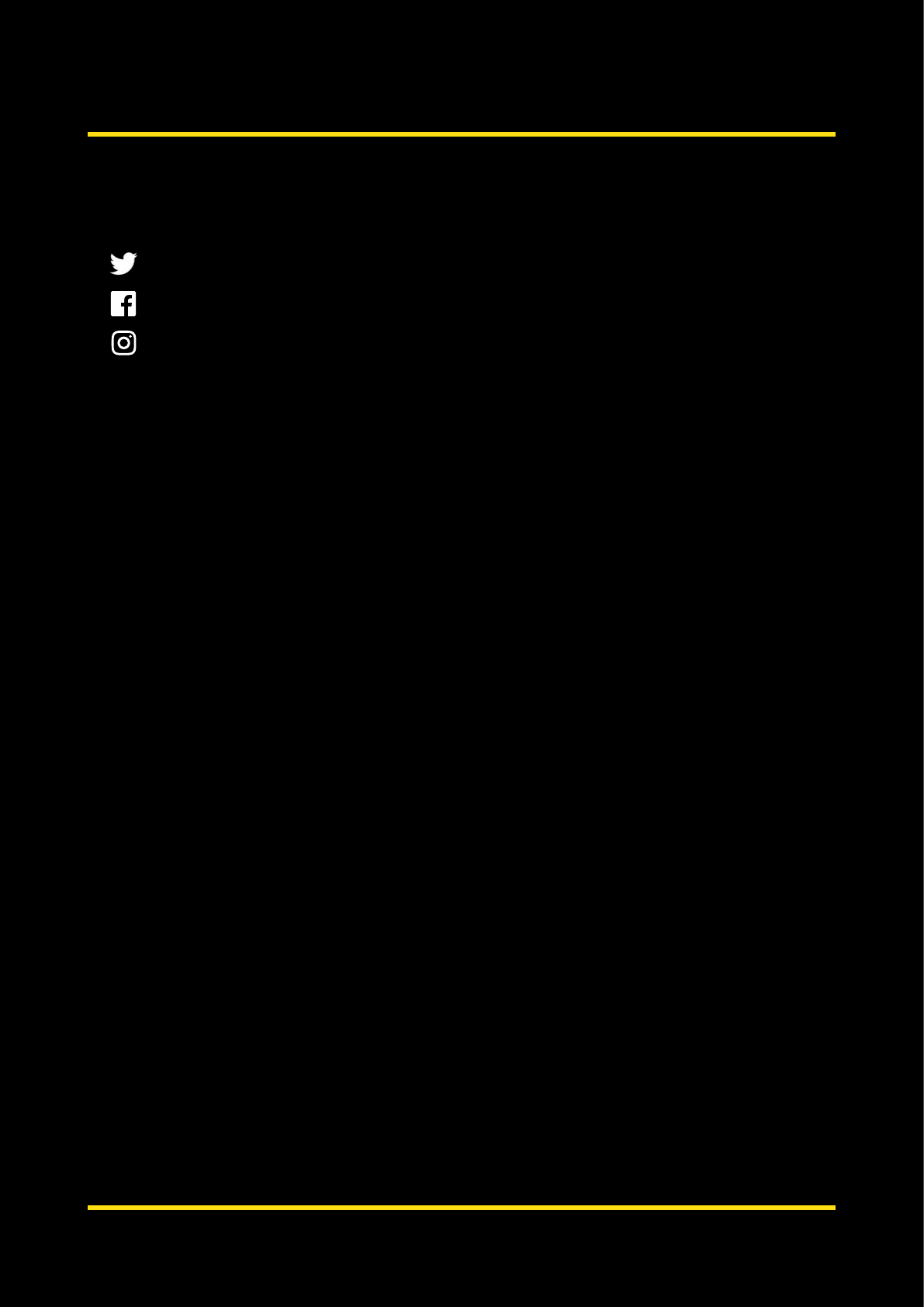
44
Follow Attitude is Everything
Follow us for updates on our work to make live music accessible for all.
Website: www.attitudeiseverything.org.uk
Twitter: @attitudetweets
Facebook: /attitudeiseverything
Instagram: @attitudeiseverythinghq
Sign up to our mailing list here: http://bit.ly/aiemailinglist

45
The research, design and launch of this report was made possible by the support of:
Arts Council England
PRS for Music
UK Music
Thank you also to the 349 people who took part in our Access Booking Survey and the
organisations who helped us to promote it.
Written by Jacob Adams, Head of Research and Campaigns
Survey design and analysis by Cedrik Kavanagh, Research Assistant
Report designed by Kathryn Corlett - www.kathryncorlett.co.uk
Acknowledgements
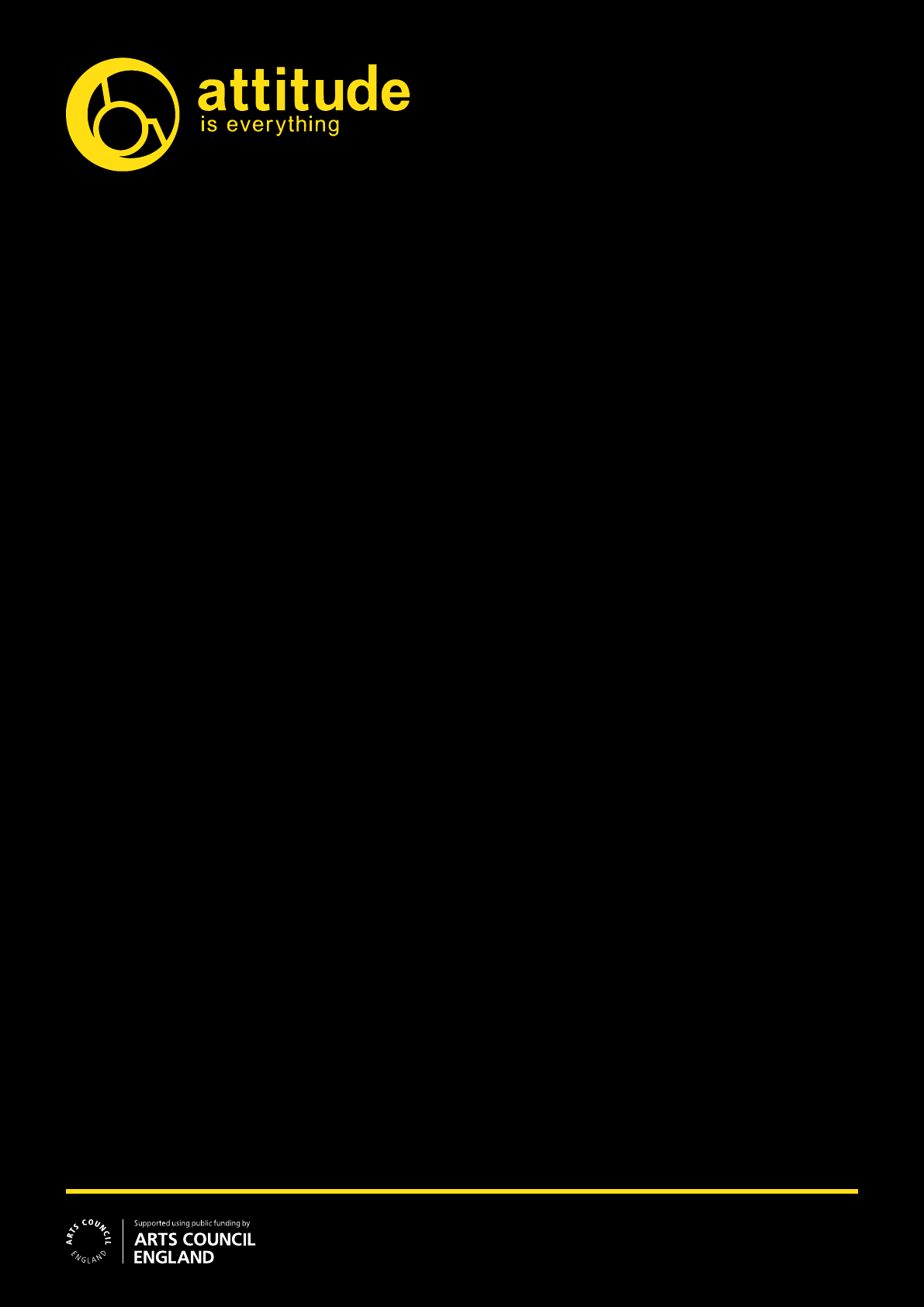
improving deaf and disabled people’s access to live music
ATTITUDE IS EVERYTHING
54 Chalton Street
London NW1 1HS
Tel: 0207 383 7979
Email: info@attitudeiseverything.org.uk
Company No: 6397532
Charity No: 1121975
Please contact us if you would like this information in an alternative format
#StateofAccess
